Write an A+ Interview Paper Using Our Tips and Examples
06 September, 2021
13 minutes read
Author: Josh Carlyle
You will quickly find yourself with your back to the wall once your teacher assigns you an interview paper. Studying is often a headache by itself, and now you have to conduct interviews. Worse yet, you probably have no idea how you can do this. Luckily, we will tell you how to write an interview paper step by step in this comprehensive guide. So prepare your favorite drink and learn how to write a top-notch interview paper.
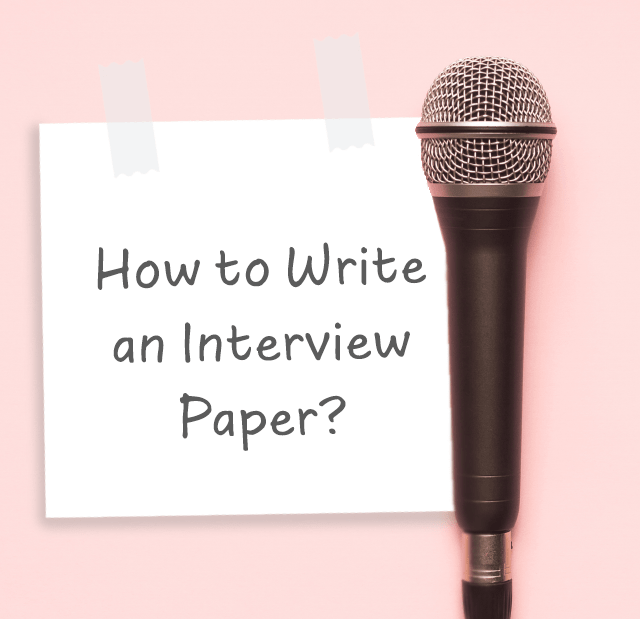

What is an Interview Paper?
An interview paper provides an expert opinion on a specific issue. In essence, it is an interview transcript inserted somewhere between the introduction and conclusion of an academic piece.
How long should it be? It depends on the topic and the length of your interview, but most papers are within the length of 2,000 – 5,000 words. What things should you consider before writing an interview paper in the first place? Let’s check them out below.
General Aspects of Writing an Interview Paper
Academic papers require you to provide arguments based on studies, research pieces, statistics, etc. But an interview paper is different – for this type of essay, you will develop assumptions around an expert’s opinion.
Let’s imagine your essay question reads the following: “Should we ban abortions?” If you write an interview paper, you should ask someone high-powered for their consideration. Let them be an executive director of the American Gynecological & Obstetrical Society.
You would reach them via email or phone or whatever communication channel you prefer and conduct an interview. Afterward, you would put all your findings on paper.
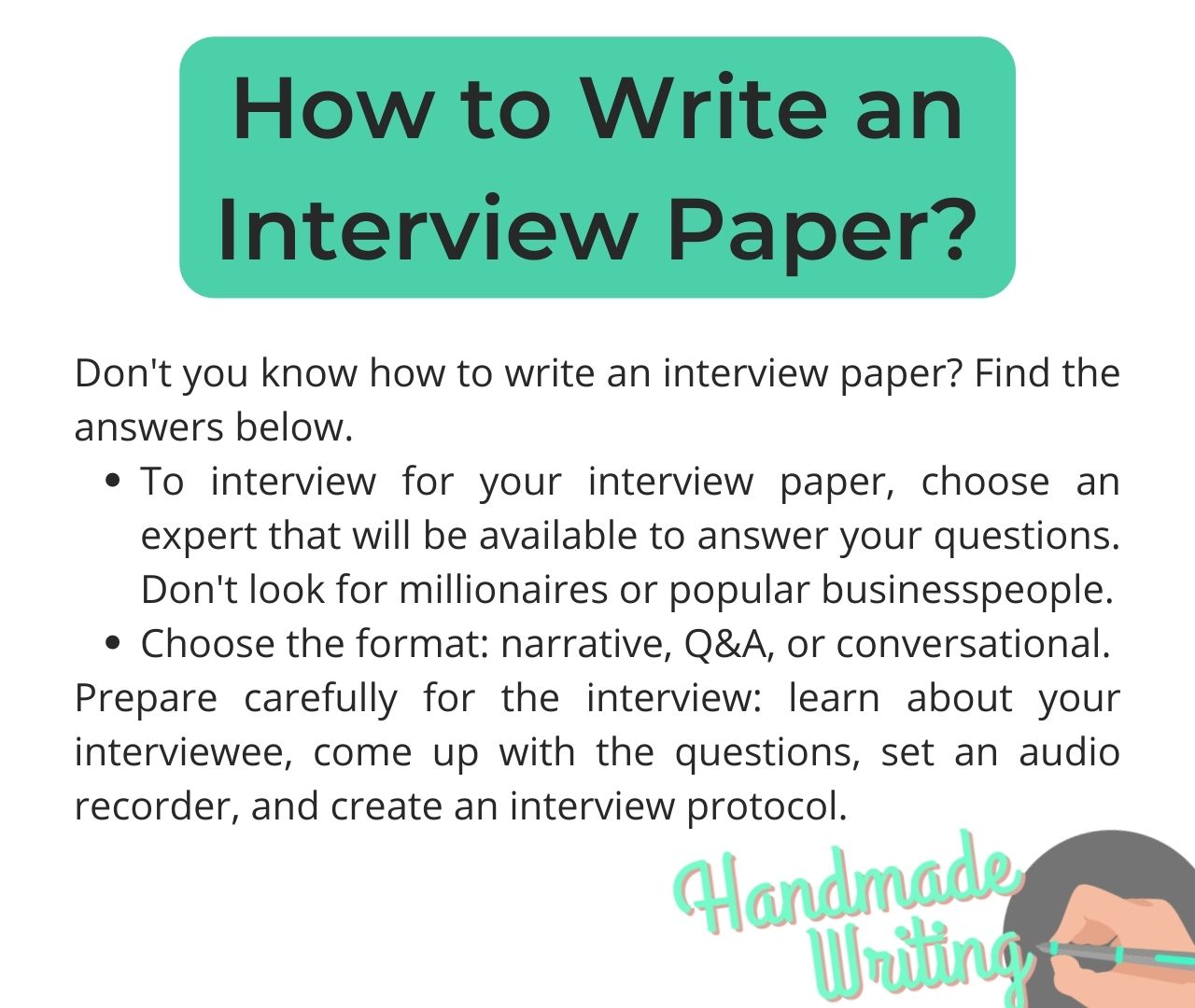
But in practice, writing an interview paper involves many more complexities and challenges, like planning, topic research , drafting, etc.
Let’s speak straight facts: nobody will reschedule their week to meet you because you need to do some homework. You’re one of the millions of students, and the local governor or a famous scientist won’t give you an interview nine times out of ten.
So you would want to target someone less busy, like professors from other faculties of your college or some researchers within your academic environment. Hunting a bigger fish is pointless unless you’re a well-established journalist working for a popular media channel. If you struggle to find someone within your college/university, you can contact people from your circle.
Writing Outline and Structure of an Interview Paper
As you know, a typical paper consists of three parts:
- Introduction. This part includes background information, the hook, the thesis statement, and the transition.
- Body. It is the longest part of the paper consisting of several paragraphs. It should contain the actual interview.
- Conclusion. The final part summarizes the considerations and insights of your essay.
The question is: ‘where should you put an interview transcript and how do you do this?’
To answer this question, you need to come up with the interview papers format in the first place. There are several of them:
The narrative format implies that you can use either direct or indirect speech when referring to your interviewee. If you choose this path, you can stick to a 5-paragraph essay structure, retell the considerations of your interviewee, and cite their words here and there at your discretion.
You can also choose this format if you contact several people. Check what a narrative interview paper structure looks like when you reach out to several people:
- Introduction.
- Paragraph #1 – the first interviewee’s perspective.
- Paragraph #2 – the second interviewee’s opinion.
- Paragraph #3 – the third interviewee’s thoughts.
- Conclusion.
Alternatively, you can dedicate each paragraph to a particular idea of one person.
“Question and answer” will suit your needs perfectly if you interview one person. It is the simplest format used in online magazines, news reports, and other media. Your interview paper outline will look like this:
- Introduction
- Question #1 – Answer #1
- Question #2 – Answer #2
- Question #3 – Answer #3
- Question #4/5/6/etc. – Answer #4/5/6/etc.
- Interview analysis. You may include your thoughts on the subject matter.
Conversational
Conversational style is informal, and you can use either first-person or second-person narrative and follow a typical 5-paragraph paper structure. But writing interview papers in this lousy style might be perplexing, especially if you deal with this task for the first time.
We advise you to try the Q&A format because it’s the simplest one and takes the least time. Just imagine how much time your paper writing will take if you decide to interview three or five people.
How to Start an Interview Paper?
If you have no idea how to start an interview paper, choose the topic first. Selecting a topic for your interview paper is not a big deal, but you should keep in mind that you may not find appropriate interviewees for it.
Let’s imagine you want to explore whether the government should force people to get vaccines. This topic implies that you need to contact authorities. It might be a local lawyer, governor, or executive director of a local hospital. Well, the chances are these people will politely refuse to give an interview for your homework.
But if you choose to investigate how lockdown impacts intellectual workers, you can contact your friends or family members who work at home. In other words, it’s better to choose topics that reflect the experiences of ordinary people rather than the opinions of untouchable experts.
Asking people for their opinion about well-known facts like the Earth’s shape is a bad idea. You would want to choose high-profile debatable topics you can actually discuss.
Establish the Goal of Your Interview Essay
You have to establish the goal of your essay before researching the topic. For this, ask yourself: “What message should your interview essay deliver?” Sometimes, a topic of your choice might already explain the purpose of your essay.
Conduct Research
Interviewing someone implies that you should ask questions. But you will fail to do so if you know little to nothing about your topic. So read some case studies, news, articles, etc. Once you get the picture of your subject matter, you will come up with dozens of interview questions.
Get to Know Your Interviewee
A good interviewer always refers to the life and experience of their interviewee. If you’re lucky to work with someone you can read about on the Internet, find out as much information about them as possible. If your interviewee publishes any books, articles, or studies, you will better know them as well.
The more you know about the person, the more interview questions you can come up with. You can ask them whether the Internet tells their true story: “Is it true that you, Mr. Interviewee, support flat earthers?”
Draft Your Interview Questions
If you want a person to share their in-depth vision of the topic, you need to ask both open-ended and close-ended (“yes/no”) questions. However, you may struggle to prepare interview questions. Many students get stuck during this stage. To overcome this block, you need to learn some types of interview questions:
- Opinion – What do you think of this topic?
- Behavioral – What would you do in this situation?
- Experience and knowledge – What do you know about the subject?
- Background – How are you connected to the subject? What is your age, occupation, etc?
- Emotional – How do you feel about the subject?
- Sensory – What does the subject taste and feel like?
You can also think of the questions following the interviewee’s “yes” and “no” answers.
Tips for Conducting a Successful Interview
These four tips will help you conduct a productive interview on the first try:
1. Plan Your Meeting
Note that you want to interview a person in a quiet place so that nobody will distract you. This might be some cozy book store or a café. Or, you can arrange an online meeting. Make sure you have at least one hour for the interview.
2. Rehearse a bit
If you will conduct your first-ever interview, you want to practice with your friends/significant other/ family in the first place. This approach will help you identify what stage of your upcoming interview may challenge you the most.
3. Record Your Interview
You will forget about 50% of the information within an hour once you finish the interview. So don’t rely on your memory − bring a recorder instead. Why not take notes? You wouldn’t want to go red while asking your interviewee to repeat what they have just said or wait until you write down their answers.
4. Talk to Your Interviewee for a While Before You Begin
Speaking to someone you don’t know might be uncomfortable. You don’t have to attack them with your interview questions straightaway. Instead, you can exchange some casual phrases or discuss the weather. This will help you relieve stress and get comfortable with each other.
5. Explain Your Interview Protocol
It’s better to explain to your interviewee how you will conduct your interview. Tell them that you will use a recorder and introduce the discussion topic.
Interview Papers Format

In academic writing, you have to explain the purpose of your interview and introduce your interviewee in a specific “scholarly” format. The APA format interview paper has the following requirements:
- Use 12-point Times New Roman.
- Write a title page.
- Use double spacing.
- Introduce your interviewee and provide the background information – explain why this person is suitable for the interview. Mention their name and qualifications.
- Use direct quotes if you cite some facts provided by the interviewee.
- Use block quotes for citations longer than 40 words.
How to Write a Title Page?
The title of your paper must include your name, your institution, department, the course name and number, the teacher’s name, and the assignment date. The rules of writing the title page are the following:
- The title page must be numbered.
- Capitalize all major words in your title and make it bold.
- Place the title of the essay three or four lines down the top of the page.
- There must be one empty line before the student’s name.
Interview Papers Examples
If you’re searching for an interview essay example – check several samples below:
- A narrative interview essay .
- A Q&A interview format paper.
- An interview with a scientist.
Interview Papers Writing Tips
The following writing tips will help you deliver the first-class interview paper:
- Write the introduction at the end. Once you finish your essay, you will likely reconsider some ideas you had before you began. They will help you frame your interview essay with a captivating introduction and conclusion.
- Give yourself a break after finishing your final draft. This will help you look at your paper with a fresh pair of eyes once you start editing.
- Edit one type of error at a time. For example, you can reduce logical errors first and switch to grammatical mistakes afterward.
- Use an active voice. If active voice makes your sentence shorter, use it without hesitation.
- Check for any sample interview paper to decide on the interview questions. Perhaps, some pieces will spark your interest.
Writing Help by Handmadewriting
An interview paper doesn’t seem that intimidating once you learn how to write it step by step. First, you have to choose the subject that allows you to interview ordinary people rather than hard-to-reach ones. Then, you need to research your topic, conduct an interview, and write a paper.
You can get an A+ for this assignment with enough effort and dedication. But a doable task doesn’t necessarily mean that you must do it by yourself. If you have plenty of other assignments to do, you can ask our essay writers to craft an exemplary interview paper for you. For this, you can place an order on our website, and we will do all the dirty work.

A life lesson in Romeo and Juliet taught by death
Due to human nature, we draw conclusions only when life gives us a lesson since the experience of others is not so effective and powerful. Therefore, when analyzing and sorting out common problems we face, we may trace a parallel with well-known book characters or real historical figures. Moreover, we often compare our situations with […]

Ethical Research Paper Topics
Writing a research paper on ethics is not an easy task, especially if you do not possess excellent writing skills and do not like to contemplate controversial questions. But an ethics course is obligatory in all higher education institutions, and students have to look for a way out and be creative. When you find an […]

Art Research Paper Topics
Students obtaining degrees in fine art and art & design programs most commonly need to write a paper on art topics. However, this subject is becoming more popular in educational institutions for expanding students’ horizons. Thus, both groups of receivers of education: those who are into arts and those who only get acquainted with art […]
- PRO Courses Guides New Tech Help Pro Expert Videos About wikiHow Pro Upgrade Sign In
- EDIT Edit this Article
- EXPLORE Tech Help Pro About Us Random Article Quizzes Request a New Article Community Dashboard This Or That Game Popular Categories Arts and Entertainment Artwork Books Movies Computers and Electronics Computers Phone Skills Technology Hacks Health Men's Health Mental Health Women's Health Relationships Dating Love Relationship Issues Hobbies and Crafts Crafts Drawing Games Education & Communication Communication Skills Personal Development Studying Personal Care and Style Fashion Hair Care Personal Hygiene Youth Personal Care School Stuff Dating All Categories Arts and Entertainment Finance and Business Home and Garden Relationship Quizzes Cars & Other Vehicles Food and Entertaining Personal Care and Style Sports and Fitness Computers and Electronics Health Pets and Animals Travel Education & Communication Hobbies and Crafts Philosophy and Religion Work World Family Life Holidays and Traditions Relationships Youth
- Browse Articles
- Learn Something New
- Quizzes Hot
- This Or That Game New
- Train Your Brain
- Explore More
- Support wikiHow
- About wikiHow
- Log in / Sign up
- Education and Communications
- College University and Postgraduate
- Academic Writing
How to Write an Interview Essay
Last Updated: March 11, 2024 Fact Checked
This article was co-authored by Diane Stubbs . Diane Stubbs is a Secondary English Teacher with over 22 years of experience teaching all high school grade levels and AP courses. She specializes in secondary education, classroom management, and educational technology. Diane earned a Bachelor of Arts in English from the University of Delaware and a Master of Education from Wesley College. This article has been fact-checked, ensuring the accuracy of any cited facts and confirming the authority of its sources. This article has been viewed 460,314 times.
An interview essay is designed to give the reader a general impression of the interview subject and to present their thoughts on a select group of topics. It also offers the opportunity to develop deeper insights by analyzing the interviewee's responses within a larger context. Interview essays are a common school assignment, and provide useful skills for those interested in journalism, or just being good writers in general. There are several formats that fit into the category, but a good interview essay of whatever type can make the reader feel as though they were asking the questions.
Interviewing for an Essay

- If your essay is to be a factual piece, you'll want to interview someone who has expertise in the subject matter you'll be addressing. If your paper is about a science topic, you'll want to interview a scientist in that field. If your paper is about a period of history, you'll want to interview either a historian or someone who's lived through that period of history.
- If you plan to make your essay an opinion piece, you'll likely want to interview someone who has a strong opinion about the topic covered in your essay. Ideally, you want someone who can express opinions articulately, and who also has credentials in the area you plan to write about.
- If your piece will have a narrow perspective, you'll need to interview only one or two people. If your piece will present a general consensus, you'll need to interview more people, probably with varying expertise and credentials.

- When available, read works about and works written by your subject, both in print and online. At the same time, research the topic associated with your subject. The more you know about both, the more intelligent questions you can ask.
- Look for previous interviews your subject has given, as well. These will give you an idea of what questions the person has been asked before, so you can decide on appropriate subjects for your own questions, including questions that no one else has asked.
- Questions that require "yes" or "no" answers are good for gathering specific factual information; open-ended "how," "why," and "tell me about" questions are great for gathering additional background material not found in your research.
- Draw up a list of the questions you are prepared to ask. Have more questions ready than you will likely use, so that you can make adjustments as the interview takes place. (For instance, your subject may begin focusing on what you thought was a side topic, but turns out to be the key part of your interview.) Rank your questions in order of importance to make sure you ask your best ones, or list them all in the order you'd ask them and color-code the most important ones.

- Choose a quiet place with few distractions for your interview site. A library, restaurant, or campus location if you're doing this for a college writing class would be suitable.
- You may want to get the interviewee's consent to use their comments in your essay in writing, as well as permission to record those comments during the interview. By law, if you are recording an interview conducted over the phone, you must obtain written permission. [4] X Trustworthy Source University of North Carolina Writing Center UNC's on-campus and online instructional service that provides assistance to students, faculty, and others during the writing process Go to source
- It's helpful to have a backup interviewee in case the person you plan to interview can't make it.
- Be on time at the place you've agreed to meet for the interview.

- Using a recording device (with permission) is almost always advisable, as it permits you to save your note-taking for jotting down your insights on contexts, themes, how your subject approaches the questions, his/her comfort level, and so on.
- Be patient and respectful as you ask your questions and wait for responses. Give the interviewee time to reflect, and you will likely be rewarded with more insightful answers. A few deeper responses are usually better than many superficial ones.
- Immediately after the interview, write down your thoughts and impressions about the interview and interviewee. They may help you shape the essay.
- Always end the interview by thanking the person.
Writing the Essay

- Narrative format. This form allows paraphrasing of some information the interviewee says, along with direct quotes for the material you most want to emphasize. This is the most likely format for a class assignment, and offers the most opportunity to add context and analysis.
- Conversational format. This is a looser format than the formal writing style required for most essays. You can address the reader directly and use both first and second person. This format can be suitable for anything from class assignments to magazine articles.
- Question-and-answer format. This form presents your questions to the interviewee, followed by the interviewee's responses. (That is, the text looks something like this: (Your Name): How long have you been in the circus? (Interviewee's Name): About 35 years.) These are always direct quotes, although you may insert explanatory material in parentheses and substitutions, such as a person's name in place of a personal pronoun, in brackets. This format is best suited for essays with only a single interviewee or a closely related group, such as spouses or the core cast of a TV show.
- Informative format. This format usually interweaves the interview with research you've done on the subject, incorporating some of that research in the text to provide background and give it a little more color.

- Read over your interview notes and listen to any audio / video recordings you have. Utilizing both whenever available will allow you to thoroughly consider both the highlights of the interview and the most significant themes to emerge from it. These, in turn, will inform your outline of what information your essay will cover and how it will appear. [9] X Research source
- One possible outline could be an introduction that starts with an anecdote about the interviewee and then presents your thesis statement, several key points that support the main focus, and a conclusion that summarizes the information presented. Traditional school essays often utilize a five paragraph format (introduction, three supporting paragraphs, conclusion), and this can often work with interview essays as well.

- If, however, the purpose of your essay is to use your interviewee's comments to support a position or examine a larger theme, your thesis will probably be a statement of that position or theme, with the interview / interviewee placed within that context. For instance: "John Doe's mixed feelings of pride and betrayal reflect those shared by many Vietnam veterans still with us."
- Regardless of essay format, make your thesis clear and concise, and be sure that the remainder of your essay refers back to it. See How to Write a Thesis Statement for more advice.

- Interviews can sometimes produce a good deal of repetitive answers (even with high-quality questions), so you may need to trim repetitions and unnecessary elements from the body of your essay. Make sure that whatever material you do keep remains true to both the spirit of the interview and the overarching focus of your essay. [10] X Research source
- A handout from the Writing Center at the University of North Carolina (available at http://writingcenter.unc.edu/handouts/oral-history/ ) provides a wealth of valuable materials on interview essays. It includes, for instance, examples of how to utilize the same interview materials in a transcription (question-and-answer format), a presentation of individual experiences (quotations and paraphrases), and the placing of the interview / interviewee in a larger context (paraphrasing and quotations with ample explanation).

- Reading over the essay yourself is a good start, but it is always wise to have another set of eyes look it over as well. Another reader is likely to catch errors, repetitions, and unclear sections that you have glossed over. [12] X Research source
- Go back to your original interview notes, recordings, and transcripts, and make sure that your essay continues to reflect the actual interview. Layers of editing and revising can sometimes cause the essay to drift away from the original source and intent. You may even want to let the interviewee read it over to ensure that it captures their voice. [13] X Research source

- Any materials you used for research, information about the interviewee, or context for the essay itself should be referenced in the approved citation format for your essay.
- Make sure one more time that any direct quotations from your source are placed in quotation marks, and any paraphrasing is done without quotation marks. Don't put words in your subject's mouth, and respect the words that do emerge from it.
What Are The Dos And Don’ts Of a Journalistic Interview?
Expert Q&A

- After the interview, send the interviewee a written thank-you note expressing your appreciation for their time. Thanks Helpful 0 Not Helpful 0
- If the person you're interviewing is busy or elderly, you may want to plan for more than one interview session. Observe the interviewee for signs of impatience or fatigue. Conduct multiple, shorter sessions if necessary. Thanks Helpful 0 Not Helpful 0

- If you plan to interview someone over the telephone, permission to record the conversation is required by law. Thanks Helpful 15 Not Helpful 3
You Might Also Like

- ↑ http://writingcenter.unc.edu/handouts/oral-history/
- ↑ https://www.indeed.com/career-advice/interviewing/interview-paper
- ↑ http://www.whatkidscando.org/featurestories/2007/maine_students/tip_sheets/FIRST-PERSON%20ESSAYS%20TIP%20SHEET.pdf
- ↑ http://www.brighthubeducation.com/help-with-writing/97515-how-to-write-an-interview-essay/
- ↑ https://owl.purdue.edu/owl/general_writing/the_writing_process/proofreading/proofreading_suggestions.html
About This Article

To write an essay from an interview, you’ll first have to decide on the format the essay will take, as this will determine the structure and what you write. The most common form is the narrative format, in which you use direct quotes and paraphrase your subject to add context and detail, or you can write in a more conversational tone, or even in a directly transcribed question-and-answer form. Once you decide on format, plan an outline by forming a central thesis, which will be the central statement your essay is making. Add onto the outline by drafting supporting evidence directly from the interview and from other sources, like books, newspaper articles, other essays, anything else to support your point. Write and finish the essay by combining information from the interview and other sources with your own explanations and words. To learn about how to conduct the interview to get enough information to write about and how to finish the writing process, keep reading! Did this summary help you? Yes No
- Send fan mail to authors
Reader Success Stories
Oct 19, 2016
Did this article help you?
Tyler Jordan
Sep 11, 2016
Tawana Moos
Nov 20, 2017
Mar 28, 2016
David Mcaniel
May 23, 2017

Featured Articles

Trending Articles

Watch Articles

- Terms of Use
- Privacy Policy
- Do Not Sell or Share My Info
- Not Selling Info
wikiHow Tech Help Pro:
Develop the tech skills you need for work and life
How to Write an Interview Essay: Questions, Topics, Examples & Tips

In the realm of writing, interviews bring a unique touch, a personal narrative that adds depth to your words. Picture this: someone's story unfolding through your pen, their experiences laid out for the world to read. But how do you capture that essence, ask the questions that matter, and turn it into a compelling read?
Fear not! Our guide breaks the interview essay examples down for you, step by step, making essay writing for interview as simple as sharing a cup of coffee with a friend. So, let's get started on turning conversations into captivating tales that will help you get your first remote job !
What Is an Interview Essay?
The process of interview essay writing is essentially a conversation transformed into written form. It involves engaging with someone, posing thoughtful questions, and then translating their responses into a narrative for others to read. Think of it as capturing the essence of a personal exchange, where the interviewee shares their experiences, insights, or expertise.
The goal is to convey the individual's unique perspective and story in a way that resonates with readers. It's like being a storyteller with a purpose – to amplify someone else's voice and share their narrative with a broader audience. Interview essays provide a platform for individuals to express their thoughts, share their journeys, and contribute their perspectives to a wider conversation.
How to Write an Interview Essay?

Step 1: Define the Essay's Purpose
Start your journey into crafting a job interview essay by figuring out exactly what you want to achieve. Ask yourself: Why am I conducting this interview, and what story or message do I want to share? It could be about someone's experiences in the professional world, valuable insights into a particular industry, or shedding light on the intricacies of a specific job role. Having a clear purpose will help you stay on track and make sure your essay has a point.
Step 2: Explore the Subject through Research
Before you dive into the interview, take some time to get to know the person you'll be talking to. Look into their background, experiences, and anything else that might be important. This research not only helps you come up with good questions but also shows the person you're interviewing that you care about their story. Knowing more about your subject makes your questions more thoughtful, turning the phone interview into a richer and more interesting conversation.
Interview Essay Topics
Need a dose of inspiration? Our experts have compiled compelling essay topics for interview. Explore and choose one that sparks your curiosity and invites in-depth analysis:
- How do people feel about remote work after experiencing it?
- What's the most memorable volunteer experience for community members?
- How do small business owners handle daily challenges?
- What makes a family game night special for different families?
- How do individuals manage stress in their everyday lives?
- What are the favorite childhood memories of people in your community?
- How do pet owners bond with their furry friends?
- What are some creative ways people stay active without going to the gym?
- How do grandparents share wisdom with younger generations?
- What role do hobbies play in people's lives for relaxation?
- How do individuals practice self-care on a busy schedule?
- What's the favorite local food joint for residents in your area?
- How do students manage their time during exam periods?
- What's the secret behind successful long-term relationships?
- How do individuals find joy in simple, everyday moments?
- How do people discover and choose their favorite books to read?
- What's the go-to comfort food for individuals on a rainy day?
- How do commuters make the most of their time during daily travels?
- What's the most cherished holiday tradition for families in your community?
- How do individuals celebrate personal achievements and milestones?
Step 3: Formulate Your Questions
Now that you've got a grip on your essay's purpose and know your subject, it's time to craft thoughtful questions. Think about what will bring out the most interesting and meaningful responses. Ask open-ended questions that encourage the interviewee to share their experiences, insights, or opinions. This step is like laying the groundwork for a conversation that will unveil the essence of your subject's story.
Interview Essay Questions
- How has the integration of technology impacted your communication within your family?
- Can you share a transformative experience from participating in a unique sports or recreational activity?
- What strategies have you employed to foster a positive work-life balance in your professional journey?
- In your opinion, what elements contribute to creating a successful and harmonious blended family dynamic?
- How do you navigate and manage personal finances to ensure financial stability and security?
- Can you recall a specific instance where a mentor or role model profoundly influenced your life choices?
- What innovative methods have you discovered for staying connected with distant relatives or friends?
- How do you incorporate mindfulness and mental wellness practices into your daily routine?
- In your experience, how do cultural traditions shape and influence family dynamics and relationships?
- Can you share a travel experience that left a lasting impact, broadening your perspective on life?
- What are your strategies for maintaining a healthy and active lifestyle despite a busy schedule?
- How do you approach and overcome creative blocks or challenges in your artistic endeavors?
- Can you recount a significant moment of personal growth or self-discovery that shaped your identity?
- What lessons have you learned from navigating a cross-cultural or interfaith relationship?
- How do you approach building a sense of community and fostering connections within your neighborhood?
- How do you incorporate eco-friendly practices and sustainability into your daily life?
- How much of an impact does social media have on personal relationships and societal dynamics?
- Did you ever face a major decision and the thought process that guided your choice?
- How do you stay informed about current events, and how does this impact your worldview?
- How much are you involved in a hobby or passion that brings you joy and fulfillment?
Step 4: Reach Out to the Interviewee and Ready Yourself for the Interview
Take the plunge and connect with the person you're interviewing. Reach out in a friendly manner, explaining your purpose and why you value their perspective. Once you've secured the interview, prepare yourself. Familiarize yourself with the questions, make sure your equipment (if any) is ready, and create a comfortable setting for the conversation. Being organized and ready ensures a smooth and effective interview process, allowing the person you're speaking with to open up and share their story effortlessly.
Step 5: Conduct the Interview
Now that you've set the stage, it's time for the main event! As you step into the interview, approach it with a genuine sense of curiosity, as if you're unwrapping a present of stories and insights. Take a moment to breathe and let the conversation unfold naturally. Pose your questions with patience, allowing the interviewee the space to share their thoughts.
Active listening is key – not just to their words but to the nuances in their tone and the emotions beneath the surface. It's in these unscripted moments that the most captivating and unexpected stories often emerge. Embrace flexibility, as sometimes the richest narratives come when you least anticipate them. Remember, your ultimate aim for successful interview essays is to authentically capture the essence of the person's experiences or insights, so let the first job interview be a genuine and unfiltered exploration.
Step 6: Select an Interview Essay Format
As you wrap up the interview, consider how you want to present its essence. The right format sets the tone and it is your tool to engage the readers effectively in your interview essays.
You have a variety of styles to choose from: opt for the classic Q&A, where questions and answers flow seamlessly; weave a narrative, transforming responses into a compelling story; or adopt a thematic structure for a logical organization. Each style brings its own flavor to the table. The format you choose becomes the lens through which your readers experience the interview, so select one that not only enhances the narrative but also resonates with your audience. Ultimately, your choice of format shapes how your audience engages with the richness of the conversation.
Step 7: Develop an Interview Essay Outline
Now that you've gathered all the insightful details, it's time to structure your essay. Create an interview essay outline that organizes the key points, highlights significant moments, and establishes a logical flow. Consider the introduction, body, and conclusion, and map out how the interviewee's story will unfold. This roadmap will guide you on how to write an interview essay, ensuring a cohesive and engaging narrative that does justice to the richness of the conversation.
Introduction:
The introduction to an interview essay is where you say hello to your reader and give them a sneak peek into what's coming. Briefly introduce who you interviewed and share a little about why their story is worth hearing. You can start with something interesting to grab attention, like a question or a surprising fact. The main job here is to make your reader curious about what comes next.
The body is where the real action happens. Think of it like the main part of a story. Each paragraph tackles a different aspect of what you learned in the interview. Start with the most important points and follow a logical order. Share the juicy details and interesting moments. Keep things organized, so your reader can easily follow along. It's all about presenting the interviewee's story in a way that's interesting and makes sense.
Conclusion:
The conclusion is your chance to wrap things up. Summarize the key points from the interview and remind your reader why it's important. You can add a personal reflection or suggest what readers might take away from the interviewee's experiences. End on a strong note, leaving a lasting impression. It's like saying goodbye but making sure it's memorable.
Step 8: Proofread Your Work
Before sharing your interview essay writing with the world, take a moment to proofread. Check for grammar and spelling errors, ensure the sentences flow smoothly, and verify that your chosen format enhances the overall readability. This step is your chance to polish the final product and present a well-crafted piece. A carefully proofread essay not only reflects professionalism but also ensures that your audience can fully focus on the captivating story you've worked so diligently to convey.
Step 9: Include Proper Citations
As the finishing touch to your interview essay, don't forget to give credit where it's due. Include proper citations to acknowledge any external sources or references used during your research. Whether it's direct quotes, paraphrased information, or data from other works, citing your sources adds credibility to your essay and shows respect for the original contributors. Follow the citation style specified by your assignment or publication guidelines, ensuring transparency and integrity in your writing. This step ensures that your readers can trace back and explore the sources that contributed to the depth of your interview essay.
Life Is about Balance — Don’t Do Things in Excess.
Hire an Expert to Balance Work and Studies!

Interview Essay Example
To illustrate the art of turning a conversation into a compelling essay, let's delve into an interview essay sample with Sarah Rodriguez, an avid urban gardener with a green thumb and a passion for sustainable living. Through this example, we'll explore how to capture the essence of someone's experiences and insights, transforming a casual chat into a narrative that resonates:
Sarah Rodriguez's balcony garden in the heart of the city is a testament to the possibilities of urban gardening. As we sat surrounded by thriving plants, she shared her journey into sustainable living and the joys of cultivating a green oasis in a concrete jungle.
Urban gardening might seem like a niche interest, but for Sarah, it's a way of life that has transformed not only her living space but also her perspective on sustainable practices. In this interview, we'll dive into the roots of Sarah's passion, exploring how she turned a small balcony into a flourishing garden and gained insights into sustainable living along the way.
Sarah's journey began with a desire for fresh herbs, a longing that led her to experiment with container gardening. 'It started small, with a few potted herbs like basil and mint,' she recalled. 'But as I learned more about sustainable gardening practices, it evolved into something much more significant.'
Each paragraph in the body delves into a different aspect of Sarah's experience. From the challenges of limited space to the joy of harvesting her own produce, the narrative weaves through her urban gardening adventure. Key moments, such as discovering the benefits of composting or experimenting with rainwater harvesting, add depth to the story.
As we wrap up the interview, Sarah reflects on the impact of urban gardening on her life. 'It's not just about the plants; it's about connecting with nature in the midst of a bustling city,' she shares. Through Sarah's journey, we glimpse the potential of turning a small balcony into a sustainable haven. This interview essay not only captures the practical aspects of urban gardening but also highlights the personal growth and connection to the environment that can stem from such a simple yet impactful endeavor.
Bringing It All Together
We hope you picked up some handy tips in this guide to shine in your journalism class. But hey, if you crave more guidance on how to prepare for a job interview essay, our expert writers are all ears and ready to share more insights! Feel free to reach out for extra help and nail that assignment with confidence.
Need a Professional Experienced Writer?
We exclusively work with the greatest authors, who offer students unique, customized writing. Ask for our assistance if you need to purchase essays online

Our Latest Blog Posts
.webp)
How to Write an Interview Essay: Complete Guide
College and high school teachers often assign interview papers to test their learners’ planning, paraphrasing, and critical thinking skills. So, besides drafting a well-substantiated and information-packed piece, students must also organize and conduct an interviewing process.
Hence, this assignment is far from straightforward. Quite the contrary, it requires substantial pre-work before the actual meeting. Moreover, the task further complicates if you include several subjects or elaborate on a compelling theme.
What if you can’t meet an ideal candidate to elaborate on your topic? How to pose questions that reveal valuable information and present your findings on paper? How to write an interview essay introduction with attention-grabbing ideas that bring up current dilemmas or resolve an issue? There are so many trilemmas spinning around your head.
Fortunately, there’s no need to feel intimated or discouraged. This article will help you grasp the basics of an interview paper and how to write an outstanding piece. It will also discuss the steps involved in the writing process and give a few helpful tips that ensure your final product passes with flying colors.
What Is an Interview Essay?
An interview paper is an academic written piece that presents the insight the interviewer gained while interviewing one or several people. It aims to expose different perspectives on a particular topic once the writer gathers relevant data through research. Typically, the essence of the paper will rest upon your findings from the interviews.
The presented viewpoints will depend on the respondent. So, for example, if your paper interview focuses on social media, you might consider talking to an influencer. Conversely, if you’re elaborating on a burning social issue, you may want to speak to a local authority. Or set up a meeting with a scientist if you’re exploring natural sciences.
The interview paper must help the reader understand a concept backed by relevant statements. Unlike definition essay writing , where you paraphrase and cite trusted sources like scholarly books, the interview paper will stem from authoritative individuals in the respective field.
Finally, you can reap a lot of benefits from drafting interview essays. More specifically, those interested in becoming broadcast journalists, newspaper reporters, or editors will learn to pose thought-provoking questions. Similarly, HR managers will polish their screening ability and hire excellent candidates. Even prospective detectives and inspectors can gain from writing an interview essay. They will formulate a variety of engaging questions to get honest and accurate answers.
Outline and Typical Structure of an Interview Paper
Most essays follow the template of a basic 5-paragraph paper. Yet, the length can vary according to your subject and data availability. A standard interview essay from a custom writing service can range from 2,000 to 5,000 words or up to ten pages. Individual works are usually shorter.
The interview essay format will have an introduction, body segments (perspectives grouped under different subheadings), and a summary. Here’s an overview of what to put in each part.
Introduction . The writer needs to create an atmosphere of uncertainty and urgency to stimulate the audience to keep reading. It should also provide background information about the theme and the interviewee. Furthermore, the initial part can list statistics or what society thinks about the respective topic. Finally, your intro must contain a thesis that transitions into the main section.
Body . This part will present the pillars on which you conceptualized your research. If you get stuck while drafting the body, you might hire an online service to write an essay for you and incorporate the gathered data. They will isolate the main points and help you frame the perfect timeline of events.
Moreover, the body should reflect important facts, life periods, and considerations of your interviewees. For instance, you might split your paper into infancy, adolescence, university, marriage, and golden years. Or you might divide your segments according to different discussion questions.
Conclusion . Use the ending part to summarize the interviewee’s thoughts and your insights into the matter. You might also compare the available data to the facts collected during the meeting and verify their validity. The bottom line must leave a lasting impression on your audience.
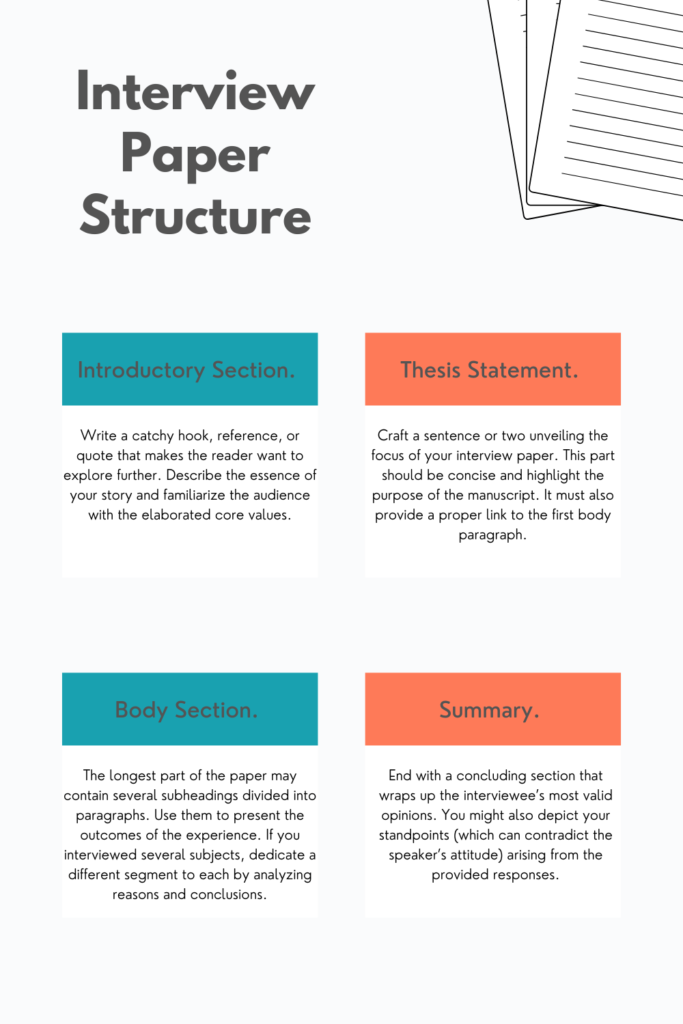
Steps for Writing a Successful Interview
Below is a detailed description of the paper composition journey. Consider each step carefully and be consistent in your approach.
Define the Paper’s Objective
Writing an interview paper urges you to establish the overall purpose. You will have to specify the message you plan to deliver. For example, if you want to verify a public opinion, you’ll have to question several subjects. Alternatively, proving a natural phenomenon will require a conversation with an expert in the field.
Explore the Subject
Find and prepare printed and virtual materials related to your research. Previous interviews and works by the interviewee are also vital. Unlike rebuttal essays , your primary goal is to gather details supporting your claims. Therefore, brainstorm any note you found based on your predefined criteria.
Pick an Interview Format
Your sample form will depend on the specific theme. Most students decide to buy a literature essay online due to their lack of formatting skills. Here are the various formats you can choose when presenting your findings.
This format implies using direct or indirect speech to analyze the storyline. Consider retelling the considerations of the interviewee and citing the original wording. The narrative format is also advisable if you talk to a few interviewees. The structure should contain an intro, a body (each paragraph can describe a particular idea of a single person), and a summary.
Question-and-answer essays are ideal when interviewing one person. Most magazines and news reports prefer this type because it is the simplest. Your interview paper will have an intro, different parts for each question and answer, an analysis with your perspective, and a summary.
Informative
Also known as conversational or personal, these papers are informal and take first or second-person narration flow. However, writing in a dialogue form might be confusing and perplexing for an untrained eye.
Formulate the Questions
Make a thorough list of all the aspects you want to discuss and cover in the interview paper. Ask close-ended (yes/no) and open-ended questions that require in-depth responses. If you struggle with your questionnaire, consider the following suggestions:
- Share your core values
- What would you change in the world if you had a superpower for a day?
- How did your childhood impact your personality?
- What is the recipe for success?
- What is the best aspect of your job?
- How do you overcome your deepest fears?
- Define happiness with examples
- What object do you hold most dear and why?
- What is the most significant challenge in our society?
- How do you imagine the world’s future?
Get in Touch with the Respondent
Make an effort to contact your interviewee/s and be professional when arranging the meeting. You might need to use several communication channels to reach your target person. Focus on scheduling a time that works for everyone involved in the project.
Facilitate the Interview
Choose a peaceful and quiet place without any distractions. Always arrive on time for the meeting. Alternatively, consider setting it up in an online format, if finding a physical location isn’t viable. Most importantly, allow the speakers enough time to share their thoughts and maintain an impartial attitude to avoid miscommunication.
Interview Essay Writing Tips
Here’s some additional advice for writers taking the first steps toward interview writing.
Stick to Your Teacher’s Instructions
Your professor will probably mention the paper structure. For instance, if you receive a classification essay writing guidelines , don’t experiment with other formats. Moreover, rehearse the face-to-face meeting with a family member to avoid possible deadens. Here, you might come up with a follow-up question that clarifies some vague points.
Quote and Paraphrase Your Sources
Organize all the details on the background, education, and achievements before interviewing itself. When referring to the topics discussed, cite them properly and give credit. Also, explain the protocol to the respondent and the purpose of the research.
Consider Recording the Interview
The longer the meeting, the more details you’ll forget once you finish it. Avoid over-relying on your memory, and bring a recorder. Taking notes is also essential. However, don’t record unless the respondent gives prior approval.
Mind These Formatting Rules
Use a font size of 12 in Times New Roman with double spacing. Don’t forget to write a title page, too. When including citations longer than 40 words, use block quotes.
Edit and Proofread
Don’t expect the first draft to be the best. Reduce grammar mistakes and typos by polishing your initial wording. The final version must be logical, easy to read, and plagiarism-free.
Bottom Line
As intimidating as the interview paper might seem at the onset, these guidelines will help you stay focused and organized. Above all, pick an important topic with questions that affect ordinary people. This way, you can set up and develop the interviews more quickly. Undoubtedly, an A+ grade takes dedication and perseverance to research and write your paper.
Related posts:
- How To Write A Good Compare And Contrast Essay: Topics, Examples And Step-by-step Guide
How to Write a Scholarship Essay
- How to Write the Methods Section for a Research Paper: Effective Writing Guide
- Explaining Appeal to Ignorance Fallacy with Demonstrative Examples
Improve your writing with our guides

Definition Essay: The Complete Guide with Essay Topics and Examples

Critical Essay: The Complete Guide. Essay Topics, Examples and Outlines
Get 15% off your first order with edusson.
Connect with a professional writer within minutes by placing your first order. No matter the subject, difficulty, academic level or document type, our writers have the skills to complete it.
100% privacy. No spam ever.

How To Write an Interview Essay
The aim of an interview is that through using people rather than books or articles, the writer can obtain a first-person viewpoint on a subject. The interview can be related to experiences in their life or may be related to a field in which they are an expert. Clearly these types of essays require a different form of planning and research. Typically, this includes the following steps:
- Determine the subject on which the person is to be interviewed.
- Identify the target interviewees, contact them, and ask for consent.
- Personal details (name, occupation, or credentials where appropriate, age if relevant, location if relevant)
- Primary question: The main focus of the work and some short main topic questions
- Notes on exploring the respondent’s answers – i.e., reminder questions for the writer such as “why do you feel that way?”, “Can you explain that in more detail?”, “Why do you think some people disagree with you?”
- Analyse the information / answers given by your interviewee.
Once you have followed these stages, you can draft / outline your interview essay in a more standard format:
- Break up the responses into key themes or points that you will make.
- Identify any other sources that you will use in your essay.
- Give an approximate word count to each section.
Note that using closed questions requiring “yes/no” answers are effective for gathering factual information, however, more detailed responses can be achieved with open-ended questions starting, “how”, “why”, “talk to me about…” and similar. Using these questions also encourages you to ask more for more detail that will expand your essay and source information.
Analysing your interviews
When analysing your interview(s), the approach will depend on the focus of your interview. For example, if you have undertaken 2/3 interviews for considering an experience, you may wish to follow the narrative route. However, if you have undertaken only one interview on a specific topic in which your interviewee is an expert, you may look at content analysis. In both cases, however you should, as you look through the interview notes or transcriptions if you have these and ask yourself:
- What reasons/ points/ perspectives did the interviewees give in support or opposition to the main topic
- Are they positive or negative?
- How does their responses compare to existing views?
- How interesting or important are the responses given?
- What is your own perspective of the views/reasons/responses given?
Once you have written down your initial analysis in order to structure your interview essay in a logical format you should then list the points/reasons given in the following way:
- least to most important
- positive first, then negative
- negative, then positive
- those you disagree with, those you agree with
- those which are pretty typical, those which are unusual.
Writing your Interview Essay
Introduction.
Your introduction should commence with an indication of the key question asked. This can either be in the form of a comment from the interviewee or a description of the situation that led to the development of your main question.
In addition, you should clearly state the type of interview undertaken (survey, narrative etc.) so that the reader has a context for your work. The introduction should then provide an overview of the responses given, along with your own perspectives and thoughts on these (your thesis statement) before introducing the body of the essay through linking. For example, “having stated X, the work will now provide a more detailed overview of some of the key comments and their implications in relation to XX”.
The body text should follow the order of your points indicated above. Use only one paragraph per point structured by indicating the point made, why you agree/disagree and any other relevant subpoints made by the interviewee in regard to the first points.
The paragraph should conclude with a link to the next theme which leads to the next paragraph and demonstrates cohesion of thought and logical flow of reporting the interview analysis. Note: you can include quotations from the interview, but do not rely on these, they should only be used to reinforce a point of view, and where possible avoid the inclusion of slang or swearing unless it is vital to the point you are making.
Your conclusion should bring together all the perspectives given by the interviewee. It is, in effect, a synopsis of the work with your own conclusions included. It is useful to refer back to the main question and your thesis statement to indicate how the interviewee answered (or not) your question and what this means for your future views or action in regard to the topic. A strong conclusion is as vital as a strong introduction and should not introduce any new information but should be a precis of the overall essay.
Key Phrases for an Interview Essay
The main subject under discussion was…”
“The interviewee was very clear when discussing…”
“The interviewee was somewhat vague when asked about…”
“This raised the question of…”
“When asked about x, the interviewee stated/asserted/claimed/maintained/declared, believed/thought/.”
“From the perspectives given by the interviewee it seems that…”
You may also like

Student Interview Essay Example (Tips for a Successful Interview)

A student interview essay is a type of academic assignment where students are required to conduct an interview with someone and then write an essay based on the insights gained from the interview. This type of essay allows students to delve into a particular topic or subject by gathering firsthand information from someone with expertise or experience in that area.
Student interview essays can be a valuable tool for learning, as they provide an opportunity for students to engage with real-life experiences and perspectives. By conducting an interview and writing an essay, students can develop critical thinking skills, improve their writing abilities, and gain a deeper understanding of the subject matter.
How to Conduct a Successful Interview
Conducting a successful interview is crucial for obtaining the information needed to write a compelling essay. Here are some tips to help you conduct a successful interview:
- Do your research: Before conducting the interview, research the topic or subject matter extensively. This will help you ask informed and relevant questions.
- Prepare a list of questions: Create a list of questions that will guide the interview and cover all the important aspects of the topic. Make sure to include open-ended questions that encourage the interviewee to provide detailed responses.
- Choose an appropriate setting: Select a quiet and comfortable location for the interview to ensure that both you and the interviewee can focus and communicate effectively.
- Be professional and respectful: Treat the interviewee with respect and professionalism. Maintain proper etiquette throughout the interview and actively listen to their responses.
- Take accurate notes: Take detailed notes during the interview to capture the interviewee’s responses accurately. This will help you when writing the essay later.
The Structure of a Student Interview Essay
A student interview essay typically follows a similar structure to other types of essays. It should include an introduction, body paragraphs, and a conclusion. Here is a breakdown of each section:
1. Introduction
The introduction should provide background information about the interviewee and the topic being discussed. It should also include a thesis statement that presents the main argument or purpose of the essay.
2. Body Paragraphs
The body paragraphs should present the information gathered from the interview in a logical and organized manner. Each paragraph should focus on a specific point or topic related to the interview.
- Example: Provide a specific example or anecdote from the interview that supports the main argument or point being discussed.
- Analysis: Analyze the information provided by the interviewee and discuss its significance or relevance to the topic.
- Supporting evidence: Use additional research or examples to support the points made in the interview.
3. Conclusion
The conclusion should summarize the main points discussed in the essay and restate the thesis statement in a concise manner. It should also provide a closing thought or reflection on the insights gained from the interview.
Common Mistakes to Avoid in a Student Interview Essay
When writing a student interview essay, there are some common mistakes that you should avoid to ensure the quality and effectiveness of your essay:
- Lack of preparation: Failing to adequately prepare for the interview can result in a lack of focus and relevant questions.
- Biased or leading questions: Avoid asking questions that steer the interviewee towards a specific answer or express your own biases.
- Failure to actively listen: Actively listen to the interviewee’s responses and engage in the conversation. This will help you gather more meaningful information.
- Inaccurate or incomplete notes: Take accurate and detailed notes during the interview to ensure the information is properly represented in your essay.
Top Interview Tips for Students
Preparing for an interview can be nerve-wracking, especially for students who are new to the process. Here are some top interview tips to help you succeed:
- Research the company or organization: Familiarize yourself with the company’s mission, values, and recent news. This will demonstrate your interest and preparation during the interview.
- Practice common interview questions: Prepare answers to common interview questions such as “Tell me about yourself” or “Why are you interested in this position?” Practicing your responses will help you feel more confident during the actual interview.
- Dress appropriately: Dress professionally and appropriately for the interview. This will show that you take the opportunity seriously and respect the interviewer’s time.
- Arrive early: Aim to arrive at least 10-15 minutes early for the interview. This will give you time to compose yourself and gather your thoughts before the interview starts.
- Ask insightful questions: Prepare a list of thoughtful questions to ask the interviewer. This demonstrates your interest in the position and your desire to learn more about the company or organization.
- Follow up with a thank-you note: After the interview, send a thank-you note or email to the interviewer to express your gratitude for the opportunity. This small gesture can leave a positive impression.
A student interview essay can be a valuable learning experience that allows you to gather firsthand information and develop critical thinking skills. By following the tips and guidelines provided in this article, you can conduct a successful interview and write an engaging essay that showcases your understanding of the subject matter. Remember to be well-prepared, professional, and respectful during the interview process, and avoid common mistakes that can diminish the quality of your essay. Good luck with your student interview essay!
Related Posts:
- Aritzia Interview Questions: How to Prepare and Succeed When it comes to preparing for a job interview, it's important to do your research and anticipate the questions that may come your way. This…
- Peloton Interview Questions: Tips and Advice for Success Are you preparing for an interview with Peloton, the popular fitness company known for its innovative exercise equipment and virtual workout classes? Landing a job…
- DevSecOps Interview Questions: Tips and Common Questions for Success Preparing for a DevSecOps interview can be a challenging task, as this field requires a unique combination of skills and knowledge. DevSecOps, which stands for…
- Mastering the Art of Rubric Interview Questions: A Comprehensive Guide Interviews are an essential part of the hiring process, allowing employers to gauge a candidate's suitability for a role. However, traditional interview questions often fail…
- Treasury Interview Questions: What You Need to Know to Ace Your Interview Preparing for a treasury interview can be both exciting and nerve-wracking. To help you feel more confident and prepared, we have compiled a list of…
Leave a Comment Cancel reply
Save my name, email, and website in this browser for the next time I comment.
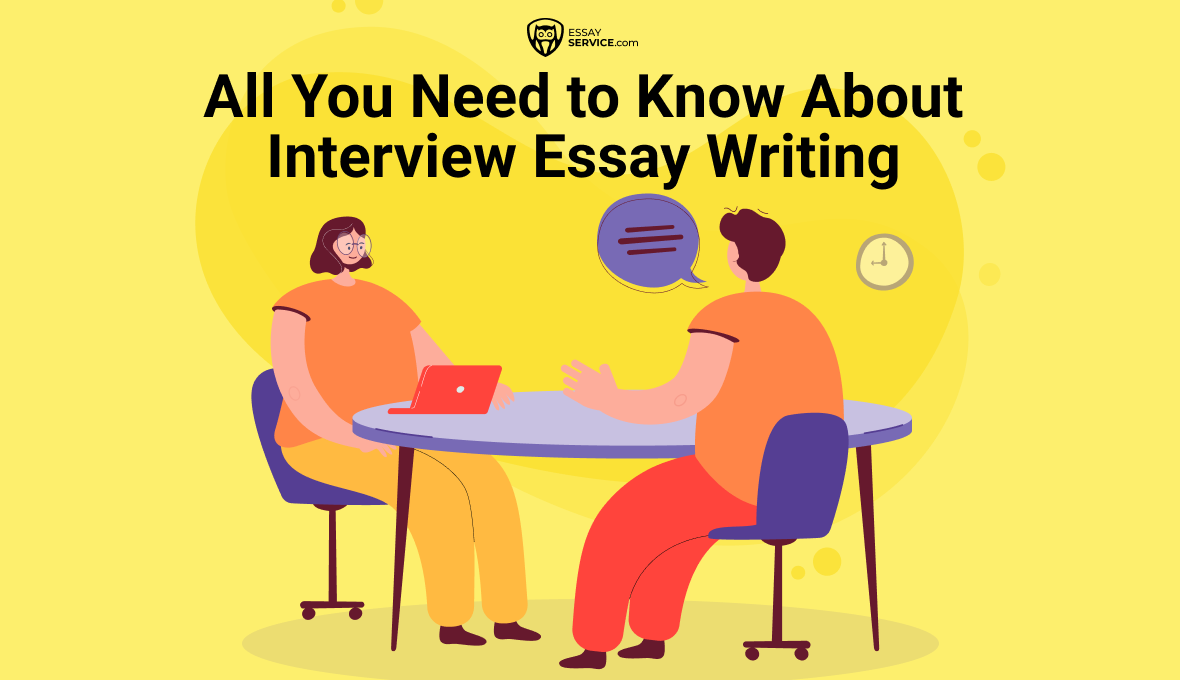
All You Need to Know About Interview Essay Writing

Purpose of Writing an Interview Essay
The writing process is not always smooth sailing. When it comes to the construction of interview papers, you are free to ask about myriads of issues of your interests and get a broad insight from the interview subject. Once you figure out the main thesis statement for your interview essay, you must collect relatable data in question-and-answer format. The gathered information is almost always subjective since the authoritative individuals and qualified experts are your main data providers. Interview essays are constructed based on people's biased opinions rather than books, historical records, and other sources.
Are you looking for answers on how to write an outline for interview essay? We are here to provide you with useful tips on how to write interview APA format essay.
You might as well find this article helpful since we have prepared essay writing in interview sample at the end of it.
Format for Writing an Interview Essay
Are you on the verge of choosing an appropriate format to write an interview essay? One of the essential steps includes identifying the type of interview paper you are willing to write. The interview essay format is determined based on the style of your paper. There are three basic types of interview papers:

- Narrative Essay Interview - Through this type of paper, you are assigned to research a specific topic based on the conducted interview. The main thing is to accumulate all the information that the interviewed person has provided in a neat and organized manner in the form of a narrative. The story might be written from your perspective or that of the interviewee. In that case, you are free to write in the first and second person.
- Personal Interview - Such type of paper demands you to prepare a list of witty interview questions to ask a specific person who holds a certain type of authority based on their professional occupation. The final product turns out to be an interview in essay format.
- Question-answer Interview - Such interview questions are often asked to job seekers. This is your chance to glance through the common interview questions that the hiring managers will ask you to get a glimpse of your personality and career goals. The questions and answers can be combined in an interview paper. For more information, check out internship interview questions and answers here.

How to Write an Outline for Interview Essay
After you have chosen key points for your interview paper and adjusted its format accordingly, you might wonder, 'should I write an outline for an interview essay ?'. The answer is clear and direct - 'Yes, definitely!'
Good writers always prepare an outline in advance, which is a great tip to lift the burden of the time-consuming paper writing process. The basic structure of interview essay outline includes three major parts:

- Introduction - As you state your paper's thesis statement, you can start writing by introducing the person or the people you interviewed.
- Body Paragraphs - The following paragraphs should contain the subjective points of view that your interviewees provided concerning your major thesis statement.
- Conclusion - In the concluding paragraph of the essay, restate the paper's main goal and summarize the most important points you have made so far.
Writing an Interview Essay Introduction
Once you wrap up the interview essay, outline you are ready to start the writing process. Writing a catchy lead and grabbing a reader's attention right away is not a simple task. However, there are some key elements that make up the best of the introduction part of your interview essay. The primary sentence should briefly contain the main objective behind the chosen topic of the paper. The following sentences should report the importance of your essay topic to your target audience. Finally, you can proceed with the thesis statement, which indicates the basic value of your paper. In other words, try to answer the question of what benefits the reader gets from familiarizing themself with your interview paper.
Do not hesitate to ask us to write an essay for me whether you are assigned to construct an interview essay on writing or any other given subject.
Writing an Interview Essay Body Paragraphs
The body paragraphs hold the majority of the essay. Provided paragraphs support the central statement with relatable facts, details, and key points as the answers that an interviewer asks.
Some of the interviewers prefer to use a recording device, while others opt for notes to contain the important data in its entirety. They choose to include parts of the narrative later in the body paragraphs of the essay as they gather the most important and thematic points made throughout the interview process. You might as well include direct quotes or in-text citations as the sources of provided answers. However, always keep in mind to ask for written permission if you plan to paraphrase or directly copy their ideas word by word according to the issue of your interest.
Writing an interview essay can be hard, so if you are looking for further tips on how to write an essay , we can provide you with an interview essay outline example as well as the complete paper itself.
Writing an Interview Essay Conclusion
The classic format for writing an interview essay includes jotting down the main objectives made throughout the paper in a final paragraph, otherwise known as the conclusion. The last paragraph is not any less important compared to the opening one. That is why you should try and restate the crucial points that interviewees have made while answering questions provided by you. That way, you will sound even more persuasive as you provide evident arguments supported by powerful public figures regarded as influential in society.
You are welcome to conclude the essay with a respectful thank you note as well. Express sincere gratification to the reader for taking the time to read your essay and focus on your contribution to them with the source of information contained in the written interview paper.
If you don’t have distinguished skills for writing an outline for college interview essay, our experts have your back! Contact us to write papers for money and enjoy a perfectly-crafted assignment.
Essay Writing Topics in Interview
Looking for inspiration? Researching an interesting topic for the essay can be exhausting sometimes. But we are here to give you a helping hand through tough times. Our experts have gathered some of the most compelling essay writing topics in interview. You are free to take a look at them and choose one that satisfies your curiosity and challenges you to be analyzed in depth.
- Does body language describe our mental state?
- How important is eye contact for establishing genuine connections?
- Are educated and qualified people obliged to give more to others?
- Which job position is the most attractive in the 21st century?
- Do career services help people get to their target job market?
- Does conflict resolution hold an important place in the contemporary world?
- What is love, and where do you feel it or experience it most often?
- How do our family heritage and traditions influence our personalities?
- How many hours of sleep are needed at different stages of life?
- What kind of skills is essential to possess in order to become a good leader?
- Should the tax system be allocated to the rich and poor accordingly?
- Is the two-party system the guarantee of American democracy in the US?
- Should combatting racism be an individual responsibility?
- Should the American people restrict the amount of money spent on the electoral college?
- How do relationships and friendships shape our lives?
- Do your dreams and nightmares reflect real-life events?
- How do you keep yourself from getting sick?
- Does technology make your daily life easier?
- Do you agree or disagree with the idea that opposites attract?
- What does it mean to be a religious and faithful person to you?
We hope those mentioned above, as well as other essay writing topics for interview in google, will fuel your curiosity.
Meanwhile, you can always pay for papers . Our experts are capable of writing an essay for a job interview based on your individual demands that will get you closer to your dream position.
Interview Essay Writing Examples
Here is one of the interview essay writing examples to check out. We hope that the provided example will give you some kind of perspective:
'A LEADER IS ONE WHO KNOWS THE WAY, GOES THE WAY, AND SHOWS THE WAY'
According to the popular idea, leaders are born rather than made. Contrary to this belief, many real-life examples prove that people can grow into a leader type as they grow older if they want to. Any man can be a leader, but it is not an easy thing to do. You need to know yourself to set an example for others, inspire them, and give them a sense of trust to follow your steps. People are inclined toward those who know where they are going, have their own vision, and are educated enough to support their decisions with rational arguments. These traits give leaders the power to be persuasive. They have their goals set and are not afraid to firmly face any challenges that life might throw their way.
To support this statement, we have interviewed a Pakistani female education activist, Malala Yousafzai, who also carries the honor of being the 2014 Nobel Peace Prize laureate. She is a pure example of how one can rise from any kind of social and domestic circumstances if one has a vision and works hard enough to achieve their goals. She realized the value of education from a very young age. The latter was often inaccessible for girls of her nation due to authoritative powers in the head of the government, under which education was banned for almost all the females in the Northern Pakistani region. Malala persistently fought for her truth and raised awareness about the value that educating girls and boys could hold. She began writing articles and her personal insights anonymously to describe the intolerable circumstances that females had to face under the group of dictators, highlighting the purpose of education and its unavailability for girls of Pakistan.
Malala's example is one of a kind. She wants to be remembered as a girl who tries to help others in whatever capacity she can hold. She did everything possible to let the outer world know about the injustice that the government of her nation committed. She never backed down even after the confrontation between her and the representatives of the ruling power at the head of the Pakistani government.
Further Academic Help
We hope you gained some beneficial information throughout this article which will help you craft a top-notch interview essay for your journalism class. In case of further assistance, our expert writers are here to provide you with interview essay examples APA format at our paper service platform.
Before you go, you are welcome to take an essay writing test for interview to check how well you understood the concept of the article and implement gained knowledge into your upcoming assignment.
Frequently asked questions
She was flawless! first time using a website like this, I've ordered article review and i totally adored it! grammar punctuation, content - everything was on point
This writer is my go to, because whenever I need someone who I can trust my task to - I hire Joy. She wrote almost every paper for me for the last 2 years
Term paper done up to a highest standard, no revisions, perfect communication. 10s across the board!!!!!!!
I send him instructions and that's it. my paper was done 10 hours later, no stupid questions, he nailed it.
Sometimes I wonder if Michael is secretly a professor because he literally knows everything. HE DID SO WELL THAT MY PROF SHOWED MY PAPER AS AN EXAMPLE. unbelievable, many thanks
You Might Also Like
.png)
New Posts to Your Inbox!
Stay in touch
Using an interview in a research paper
Consultant contributor: Viviane Ugalde
Using an interview can be an effective primary source for some papers and research projects. Finding an expert in the field or some other person who has knowledge of your topic can allow for you to gather unique information not available elsewhere.
There are four steps to using an interview as a source for your research.
- Know where and how to start.
- Know how to write a good question.
- Know how to conduct an interview.
- Know how to incorporate the interview into your document or project.
Step one: Where to start
First, you should determine your goals and ask yourself these questions:
- Who are the local experts on topic?
- How can I contact these people?
- Does anyone know them to help me setup the interviews?
- Are their phone numbers in the phone book or can I find them on the Internet?
Once you answer these questions and pick your interviewee, get their basic information such as their name, title, and other general details. If you reach out and your interview does not participate, don’t be discouraged. Keep looking for other interview contacts.
Step two: How to write a good question
When you have confirmed an interview, it is not time to come up with questions.
- Learning as much as you can about the person before the interview can help you create questions specific to your interview subject.
- Doing research about your interviewee’s past experience in your topic, or any texts that they have written would be great background research.
When you start to think of questions, write down more questions than you think you’ll need, and prioritize them as you go. Any good questions will answer the 5W and H questions. Asking Who, What, When, Where, Why, and How questions that you need answered for your paper, will help you form a question to ask your interviewee.
When writing a good question, try thinking of something that will help your argument.
- Is your interviewee an advocate for you position?
- Are they in any programs that are related to your research?
- How much experience do they have?
From broad questions like these, you can begin to narrow down to more specific and open-ended questions.
Step three: The interview
If at all possible, arrange to conduct the interview at the subject’s workplace. It will make them more comfortable, and you can write about their surroundings.
- Begin the interview with some small talk in order to give both of you the chance to get comfortable with one another
- Develop rapport that will make the interview easier for both of you.
- Ask open-ended questions
- Keep the conversation moving
- Stay on topic
- The more silence in the room, the more honest the answer.
- If an interesting subject comes up that is related to your research, ask a follow-up or an additional question about it.
- Ask if you can stay in contact with your interview subject in case there are any additional questions you have.
Step four: Incorporating the interview
When picking the material out of your interview, remember that people rarely speak perfectly. There will be many slang words and pauses that you can take out, as long as it does not change the meaning of the material you are using.
As you introduce your interview in the paper, start with a transition such as “according to” or other attributions. You should also be specific to the type of interview you are working with. This way, you will build a stronger ethos in your paper .
The body of your essay should clearly set up the quote or paraphrase you use from the interview responses,. Be careful not to stick a quote from the interview into the body of your essay because it sounds good. When deciding what to quote in your paper, think about what dialogue from the interview would add the most color to your interview. Quotes that illustrate what your interviewer sounded like, or what their personality is are always the best quotes to choose from.
Once you have done that, proofread your essay. Make sure the quotes you used don’t make up the majority of your paper. The interview quotes are supposed to support your argument; you are not supposed to support the interview.
For example, let’s say that you are arguing that free education is better than not. For your argument, you interview a local politician who is on your side of the argument. Rather than using a large quote that explains the stance of both sides, and why the politician chose this side, your quote is there to support the information you’ve already given. Whatever the politician says should prove what you argue, and not give new information.
Step five: Examples of citing your interviews
Smith, Jane. Personal interview. 19 May 2018.
(E. Robbins, personal communication, January 4, 2018).
Smith also claimed that many of her students had difficulties with APA style (personal communication, November 3, 2018).
Reference list
Daly, C. & Leighton W. (2017). Interviewing a Source: Tips. Journalists Resource.
Driscoll, D. (2018 ). Interviewing. Purdue University
Hayden, K. (2012). How to Conduct an Interview to Write a Paper . Bright Hub Education, Bright Hub Inc.
Hose, C. (2017). How to Incorporate Interviews into Essays. Leaf Group Education.
Magnesi, J. (2017). How to Interview Someone for an Article or Research Paper. Career Trend, Leaf group Media.
How to Begin an Interview Essay
- Job Interviews
- Conducting Interviews
- ')" data-event="social share" data-info="Pinterest" aria-label="Share on Pinterest">
- ')" data-event="social share" data-info="Reddit" aria-label="Share on Reddit">
- ')" data-event="social share" data-info="Flipboard" aria-label="Share on Flipboard">
How to Answer Interesting Facts About Yourself
How to write a memorandum to a ceo to approve working documents, how to respond to interview requests by letter.
- What to Write in an E-mail When Forwarding a Resume
- Editorial Interview Tips
If you are asked to write an interview essay for an assignment, be alert during the interview for a "hook" on which to base the article. Indeed Career Guide suggests taking notes or asking permission to record the interview. With the interview over, you have to create a compelling introduction for your essay.
Ideally, as you interviewed the subject chosen for your assignment, one part of the interview struck you as particularly humorous, insightful or provocative. Use this information to craft a memorable introduction that will engage your readers and enlighten them about the unique person interviewed.
Share Biographical Information
The introduction for an interview writing assignment starts by identifying the person selected for the essay. Weave in timely information about the interviewee without bogging down the introduction of your essay with extraneous detail. Long rambling introductions may bore the reader.
Briefly note important biographical information. For example, you might include how long the interviewee has been president of the company, her credentials and how many people she supervises. Include biographical details that help explain why you selected that particular person to interview.
Include Interesting Anecdotes
Choose an anecdote that captures the essence of the person you interviewed or the main idea of the essay. The anecdote should serve as a microcosm of the essay to come. For example, if the person you interviewed is now president of a company and admitted that a childhood turning point was becoming president of the student council in high school, focus your anecdote on the interviewee’s fledgling leadership skills or determination.
Refine the anecdote so that it goes directly to the heart of the action and put your reader in the center of a revealing turning point. You might do this, for example, by recounting the suspense of election night as vote returns were being counted in high school or the day the interviewee gave her first speech as student council president.

Tell a Captivating Story
Self-edit your words and sentences as you write your interview essay remembering that you are a storyteller and an audience is depending on you to be engaging and interesting. To this end, choose crisp, lively and descriptive words and eliminate any information that fails to move your essay forward or is irrelevant. Stay focused on your topic.
Interview essay examples might tell a story of how your subject overcame poverty, received a Purple Heart or patented an invention. Even everyday people in your life have remarkable stories to share. Ordinary but inspirational interview writing examples might include how your parents met or started a family business.
Use Poignant Quotes
Select a revealing quote from the interviewee that deftly underscores the main idea of the essay or the spirit of the anecdote, suggests the University of Nevada, Reno . For brevity’s sake, choose a direct quote that is no more than two sentences long. Letting your readers “hear” from the interviewee is an effective way to segue from the introduction to the remainder of the essay.
Lastly, proofread and edit the essay for spelling, punctuation and grammar. Take advantages of free writing tools such as the comprehensive and authoritative Purdue Online Writing Lab (OWL) to plan and review your writing assignment.
- Purdue University Online Writing Lab: Expository Essays
- Indeed Career Guide How to Write an Interview Paper
- University of Nevada, Reno: Using an Interview in a Research Paper
- Daily Writing Tips.com: The Impotence of Proofreading
- Proofread and edit the essay for spelling, punctuation and grammar.
Related Articles
How to reschedule an interview via email, 30-second interview examples, how to write an interview script, how to write interview acknowledgement letters, how to write a sample letter accepting an interview opportunity, how to write an inspirational speech, how to sell yourself in a 60 second interview, how to document quotes from an interview, how to do an effective business presentation introduction, most popular.
- 1 How to Reschedule an Interview via Email
- 2 30-Second Interview Examples
- 3 How to Write an Interview Script
- 4 How to Write Interview Acknowledgement Letters
All Formats
Essay Templates
- 20+ Interview Essay Templates
An interview essay is a simple form of writing that relays the information being gathered through an interview template . It is done to make the readers knowledgeable of the items discussed during the interview process. This type of essay allows the writer to relay his or her impressions on the interview that occurred and the precise data from the interview.
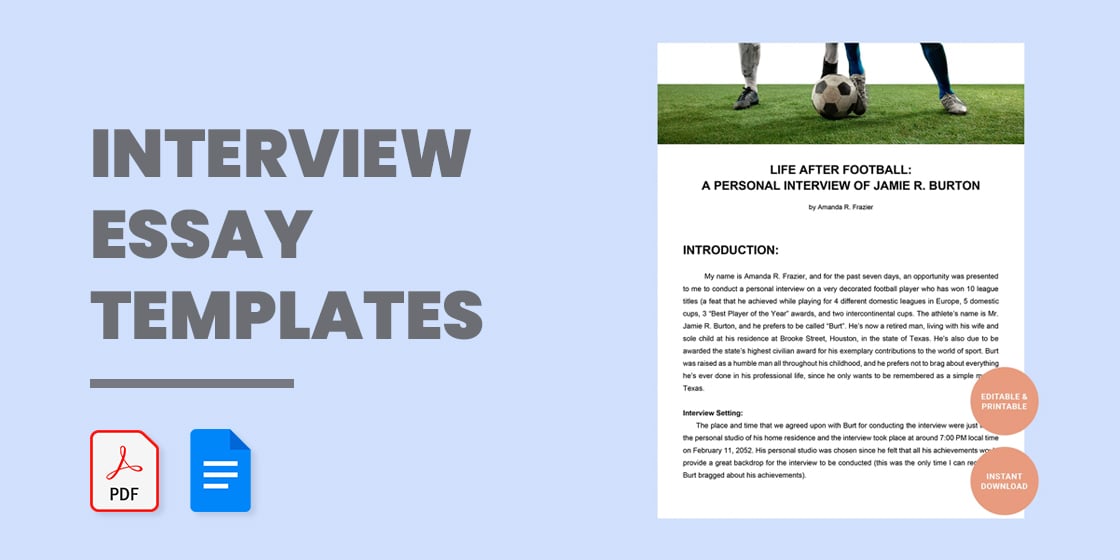
Student Interview Essay Template
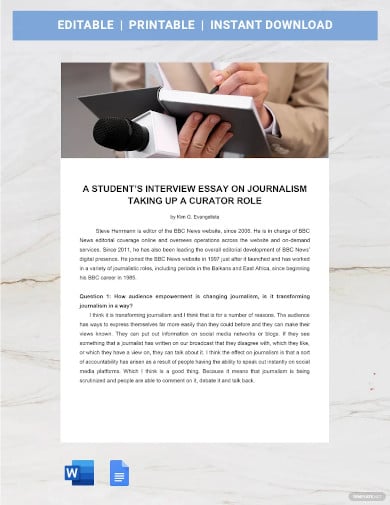
- Google Docs
Family Interview Essay Template
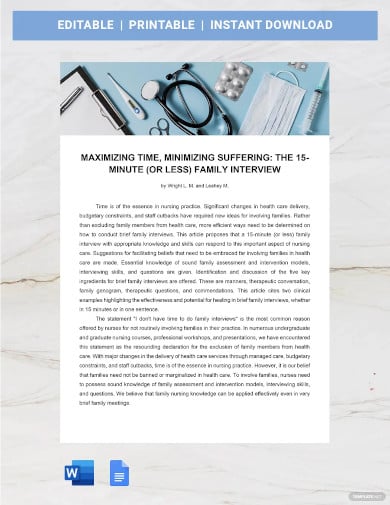
Personal Interview Essay Template
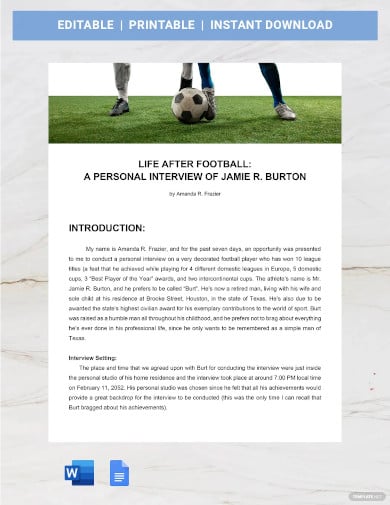
Interview Essay Sample Template
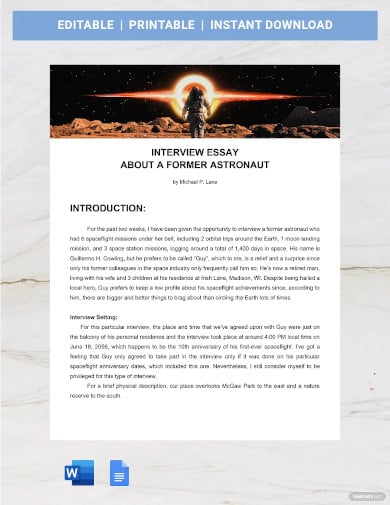
Job Interview Essay Template
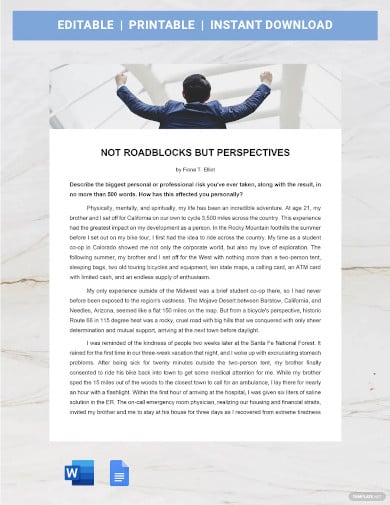
Informational Interview Essay Template
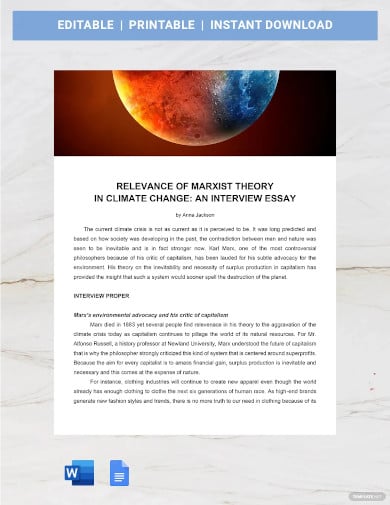
Leadership Interview Essay Template
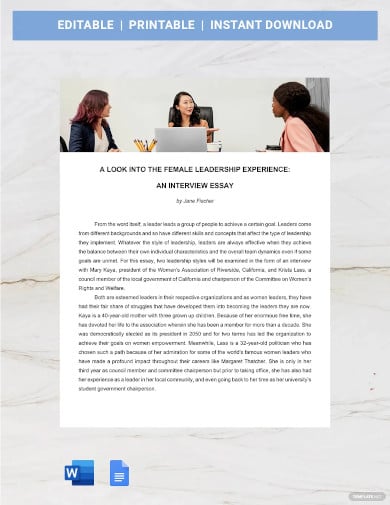
Free Interview Essay Example Template
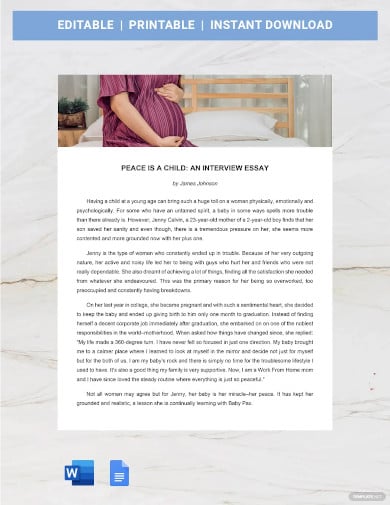
Teacher Interview Essay Template
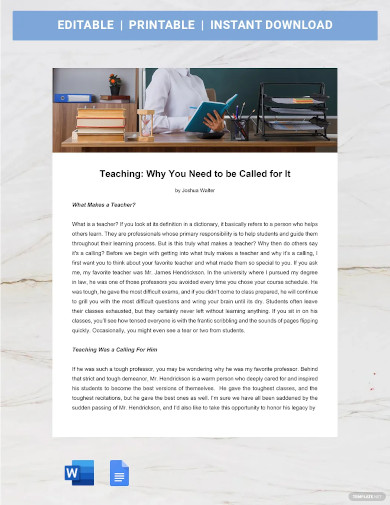
Nursing Interview Essay Template
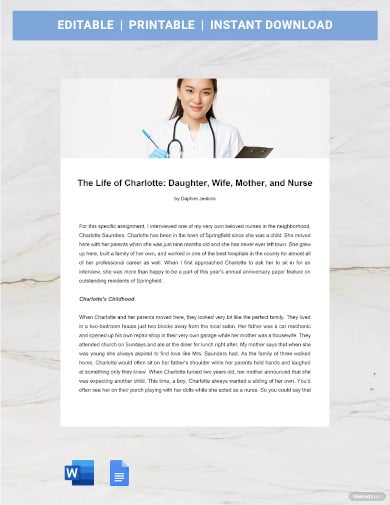
Interview and Writing Essay Assignment
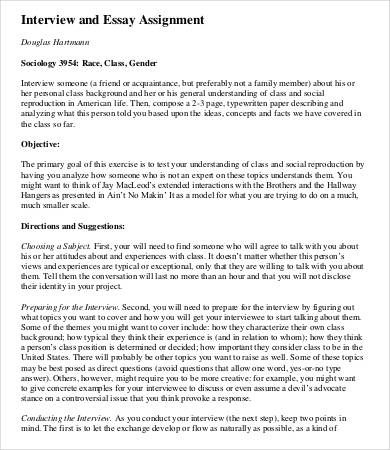
Interview Reflective Paragraph Essay
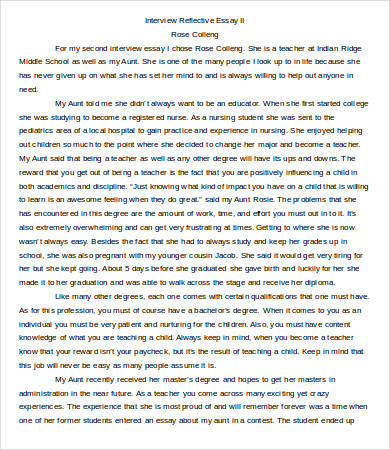
Free High School Interview Essay Sample
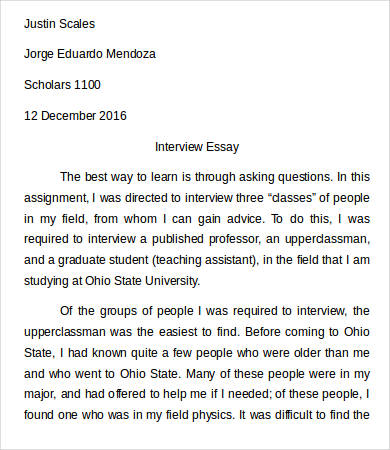
Personal Career Interview Case Study Essay
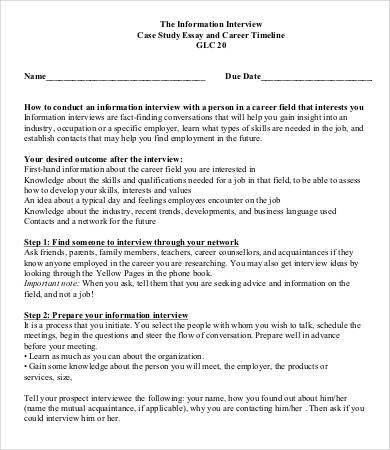
Sample College Narrative Interview Essay
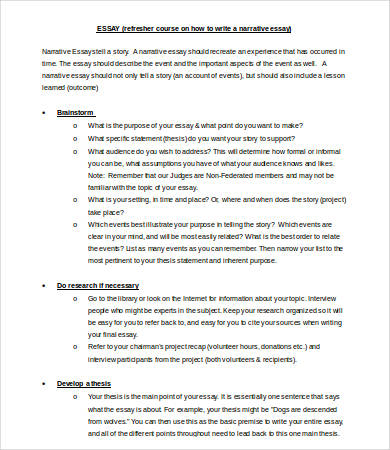
Extended Definition Essay with Interview Paper
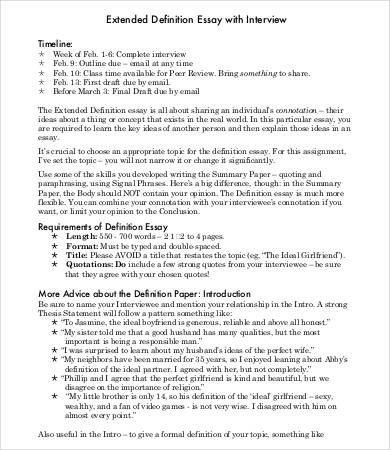
Professional Student Interview Essay Template
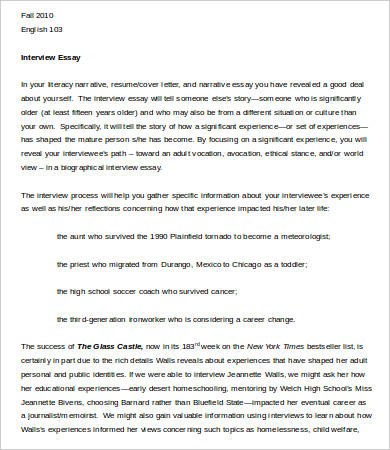
The Process of Creating an Interview Essay
- Think first of the topic that you want to write about. This will serve as your guide on selecting the person that you want to interview.
- Know the purpose of your essay. If you think that interviewing just one person is enough, then it will already do good to Word interview one. It also varies on the mood that you want your writing to have.
- Prepare interview questions. Base your questions on your chosen topic so you can already have a guideline on what to ask. With this, you can already create a structure for your essay as you already have an idea of what is going to be in it. An information Sheet will just vary depending on the answers of your interviewee.
- Quoting your interviewer. If you want to quote the interviewee in some parts of your essay, make sure to write the precise sample statement that he or she has said during the interview. If you cannot write at a fast pace, using an audio-recording device to record the entire interview with the permission of the PDF interviewee is of great help.
- Prepare for the essay. After the interview, construct your thoughts and create a flow of ideas where you can insert the items being answered during the interview.
- Start writing your interview essay and make sure that you are following the pattern that you have created for a cohesive thought pre-construction .
Interview Essays with Journalists and Politicians
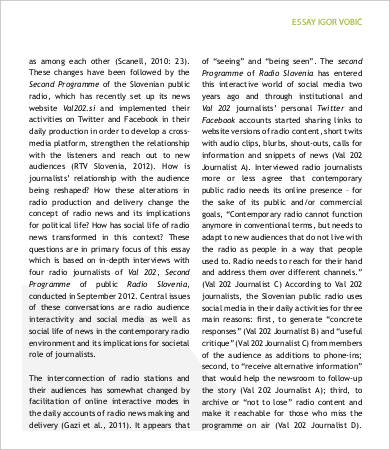
Job Interview Essay Report with Introduction
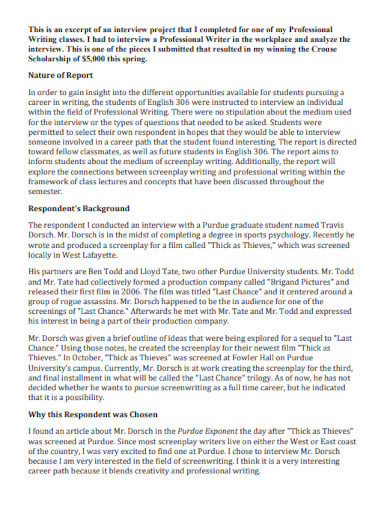
Interview Essay with APA Documentation Style
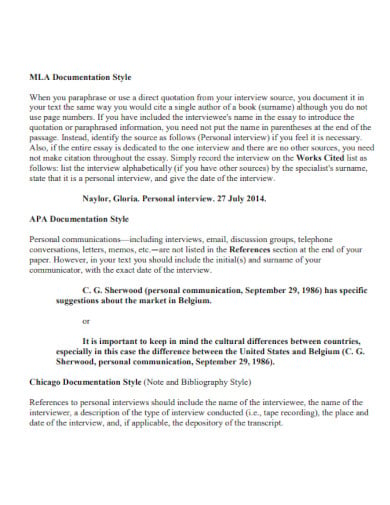
Leadership Interview Reflective Essay
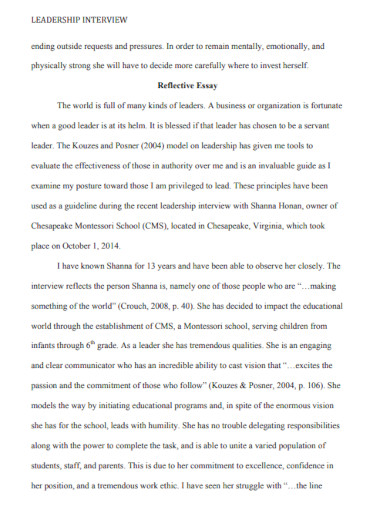
Capture the Attention of Your Readers
More in essay templates, interview essay example, interview article template, interview essay in apa documentation style template, personal career case study interview essay template, job interview essay report with introduction template, reflective interview essay template, reflective leadership interview essay template, high school interview essay template, extended definition essay with interview template.
- How to Make/Create a College Essay [Templates + Examples] 2023
- How to Make/Create a Rhetorical Analysis Essay [Templates + Examples] 2023
- 5+ Free Descriptive Essay Templates – PDF
- 15+ Essay Format Templates – PDF
- 11+ Free Descriptive Essay Templates – PDF, DOC
- 19+ Essay Templates in PDF
- How to Make/Create a Narrative Essay [Templates + Examples] 2023
- 14+ 5 Paragraph Essay Templates – PDF
- How To Make/Create a 5-Paragraph Essay Outline [Templates + Examples] 2023
- 10+ Argumentative Essay Outline Templates – PDF
- 9+ Leadership Essays
- 13+ Literary Essay Templates in Word | Google Docs | Apple Pages | PDF
- 7+ Extended Essay Templates
- 9+ Free Downloadable Informative Essay Samples and Examples
File Formats
Word templates, google docs templates, excel templates, powerpoint templates, google sheets templates, google slides templates, pdf templates, publisher templates, psd templates, indesign templates, illustrator templates, pages templates, keynote templates, numbers templates, outlook templates.
How to Write an Interview Essay Introduction

If you’re looking for freelance essay writers for hire , you’ll want to know what a good interview essay introduction looks like so you can judge the quality of their work. An essay introduction can be tricky to get right, but if it’s written well, it can really pull the reader in and help set the tone for the rest of the essay.
But before we dive into how to do it right, let’s briefly touch upon what an interview essay really is.
What Is an Interview Essay?
At its core, an interview essay is an essay that explores different perspectives of people on a given topic. Unlike other types of essays, such as argumentative or persuasive essays, an interview essay doesn’t try to win over the reader to one particular point of view. Instead, it allows the reader to better understand the views of those who are interviewed by providing first-hand accounts of their experiences.
When contemplating what makes an essay good , writing an effective essay introduction is of the utmost importance–so let’s take a look at what to include in your introduction.
What Should I Include in an Interview Essay Introduction?
There are a few key elements that should ideally be included in any good interview essay introduction. First, you’ll want to introduce the person or people you interviewed. This can be done by providing a brief overview of who they are and why you decided to interview them. Next, you’ll want to include a thesis statement. This is a sentence or two that sums up the main point of your essay. It should be clear and concise, and it should give the reader an idea of what they can expect to learn from reading your essay.
Finally, you’ll want to conclude your introduction with a brief sentence or two that will leave the reader wanting more. This can be done by providing some of the information you’ll be discussing in the body of the essay, or by asking a question that will pique the reader’s curiosity. There are a few things you can do to spice up your interview essay introduction, which is what we’ll discuss next.
How to Make Your Interview Essay Introduction More Interesting
Start with a bang.
This means starting with something that will immediately grab the reader’s attention and make them want to keep reading. One way to do this is to start with a shocking statistic or fact related to your topic. For example, if you’re writing an interview essay about poverty in America, you could start with the fact that a certain number of Americans live in poverty–this would certainly get the reader’s attention and make them want to learn more about what you have to say.
Use a Quote
Another great way to start an essay is with a quote from someone who is knowledgeable about your topic. This could be an expert on the subject or even someone who has first-hand experience with it. Either way, their words will carry a lot of weight and help set the tone for your essay.
Ask a Question
Asking a question in your introduction can be a great way to get the reader thinking about your topic. This will help engage them and get them invested in what you have to say.
Use Humor
If used correctly, humor can be a great way to engage the reader and get them interested in your essay. Just be careful not to overdo it, as too much humor can be a turn-off for some readers.
A Solid Interview Essay Introduction
Now that we’ve discussed what to include in your introduction, let’s take a look at an example of a good interview essay introduction:
“In today’s society, it’s easy to get lost in the shuffle. We’re all so busy working and taking care of our families that we often don’t have time for ourselves. This can lead to feeling stressed, overwhelmed, and even angry. But what if there was a way to reduce the amount of stress in our lives?
That’s where yoga comes in. Yoga is an ancient practice that has been shown to provide numerous health benefits, including reducing stress levels. In fact, a recent study found that yoga can be just as effective as medication in treating anxiety and depression.
To determine whether yoga can really help reduce stress in our lives, I decided to interview yoga instructor Jenny Miller. Jenny has been teaching yoga for more than ten years and has helped countless people find relief from stress and anxiety. She was kind enough to agree to answer a few questions about her experience with yoga and how it can help reduce stress.”
From interview essay writers to MetaTrader programmers , Guru has the expert you need for your projects.

What Makes an Essay Good?

Why Drupal Is Better Than WordPress
Related posts, what are the roles of support personnel, what is remote customer service, what does a customer support agent do, write a comment cancel reply.
Save my name & email for next time.
- How Guru Works
- Work Agreements
Type above and press Enter to search. Press Esc to cancel.
Job Interview Essay

As one would expect during a job interview, your employer may be asking you to write something . This would be in the form of an essay. This is usually about your experiences, your skills and all the basic information they need to know more about you. They do this to see and to understand you as a person. Here are some 7+ job interview essay examples you can check out for some tips on what to write and what to avoid.
7+ Job Interview Essay Examples
1. job interview essay template.

Size: 95 KB
2. Sample Job Interview Essay
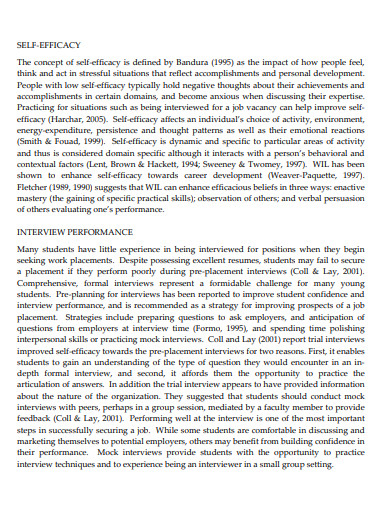
Size: 430 KB
3. Basic Job Interview Essay
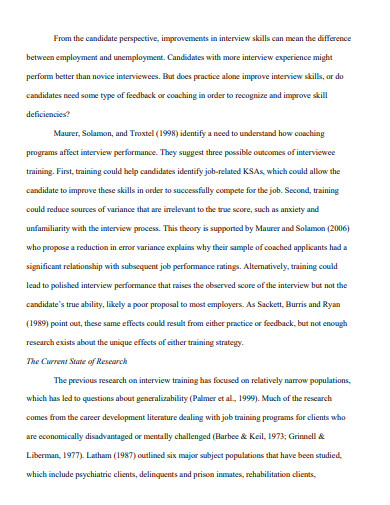
Size: 573 KB
4. Job Interview Question Database Essay
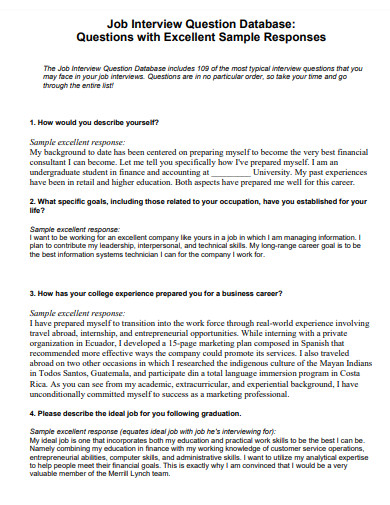
Size: 90 KB
5. Job Interview Essay in PDF
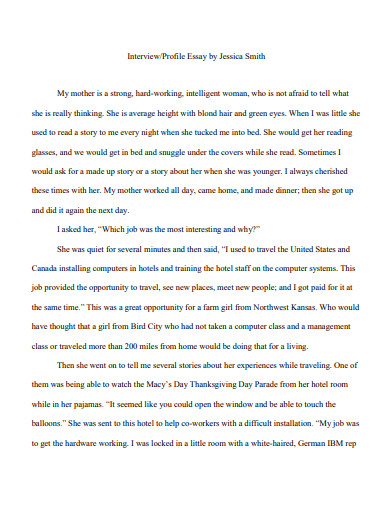
Size: 75 KB
6. Printable Job Interview Essay
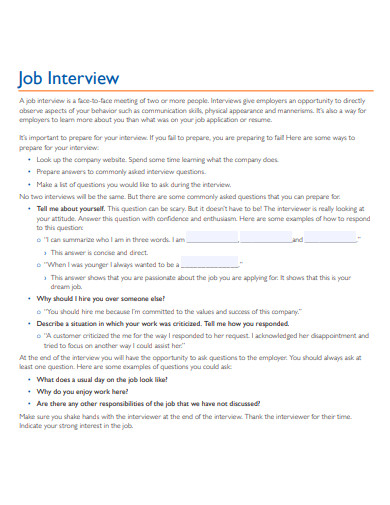
Size: 66 KB
7. Job Interview Strategy Essay
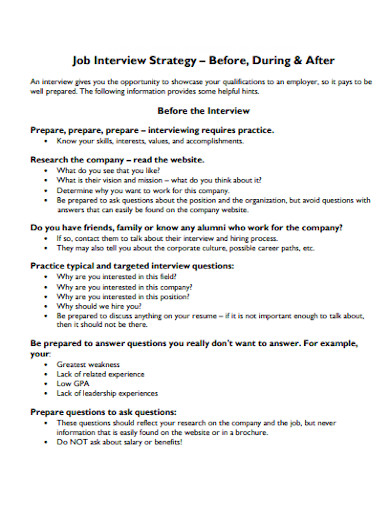
Size: 150 KB
8. Formal Job Interview Essay
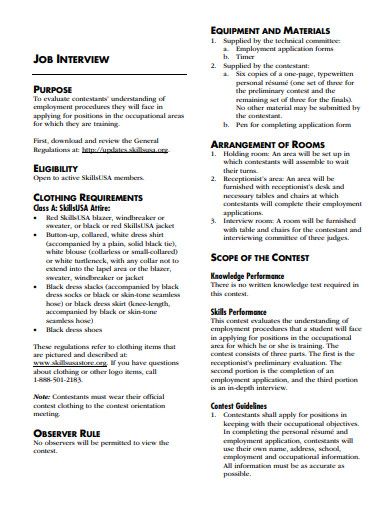
Size: 192 KB
Define Interview
An interview is a meeting face to face. It is usually a conventional conference . A conversation or a questioning for the purpose of getting information from the interviewee.
Define Job Interview
A job interview is a dialogue between an employer and the applicant. In a job interview, the employer asks questions about the applicant’s work history, educational history, and skills.
Things to Avoid in Writing a Job Interview Essay
Some of us get so excited when writing essays, like that of a job interview, but one thing we must remember is to summarize the job interview essay We often forget that an essay is nothing but a short summary of what we wish to write. But that’s okay. It’s nothing different. But unlike some of the essays you may be used to, there are some things to avoid when writing for a job interview essay. Here are some of the things you need to avoid at all cost.
- Lying about your answers – when writing about what is asked, be careful. Interview questions in an essay may be tricky. Do not make up anything to make your essay sound nice. The interviewer would not be amazed one bit if you lied in your essay. Rather, there is a bigger chance they will not accept you.
- Flowery words – Most of us are guilty with this when writing the essay. It is best to avoid putting flowery words to make it sound like we did these things. Again, your employer has a way of knowing you are being truthful or lying. Avoid this at all costs.
- Too proud – this is often taken for granted but I want to put it right here. Do not boast about the experiences you may not have and write it off as yours. Do not boast about the experiences you have in your essay. You have to remain open and humble.
Things You Should Remember When Writing an Essay
- Voice – keep it professional. The tone in your essay has to be in a professional setting. If you write in a childish manner or as if you are angry at someone, your employer or anyone reading it will surely see that you are not fit for the job.
- Information – write what is asked in the essay. Do not put any other information that is not required nor needed. Example for this information is through a question that goes like this “why should we hire you?” This may sound easy but be very careful as to what you are going to write or say. Do not forget to introduce yourself in your essay.
- Explaining – In some questions in an essay, you are required to explain. Like the sample question above, you must give an explanation in your own words as to why they should hire you. However, avoid saying explanations like “because I am the best”, “I am better than anyone.” This will not only make you lose your opportunity, it is also very rude to tell that to your employer.
- Descriptive – keep your essay as descriptive as possible . When you are to general in your writing, you are making the person reading confused. Put a little effort to what you are writing.
- Be prepared – when you are going to a job interview, always expect the unexpected. Answer questions as honest as possible.
- Reflect – reflect on what you have written . Understand what you have learned and done. A job interview essay is simply one of many essays you are going to go through.
I want to write about my experiences related to the job, should I write down everything?
Yes you may. As long as you remember that what you are writing is true and correct. As well as be careful on how you word it. Your tone in writing should be professional.
Why am I not allowed to show off my skills in my essay?
Employers are interested in what you have, but they are not interested in the way you talk about it. They prefer to see someone professional talking about their experiences in the same professional tone. Rather than being too cocky.
Is it necessary to know your skills? What if I don’t?
It is better to know what you are good at. When your employer may state you need to write your skills in the essay, you have to be prepared to do so. Ask yourself what you are good at and write it down.
Is there a time limit to writing the essay?
Most companies give a certain amount of time for the applicant to finish the job interview essay. This is so that neither of the two parties are wasting time. Be prepared to write a good essay within a limited amount of time.
Writing a job interview essay can be difficult. It can also be rewarding knowing you did a good job and you have done what you were told to do. Though a job interview essay may not give you the outcome of getting that job, but it is good practice on showing off your skills. Once you find out how to write a good essay for a job interview, all you need to do is to remember the guidelines.
To remember not to be too cocky when writing about your experiences. Do not be too shy either, rather be professional about it. Employers do read your essay, so be careful what you write. Watch your grammar and how you word things as well. This can affect the opportunity of getting that job. With all that being said, I wish you luck.
Job Interview Essay Generator
Text prompt
- Instructive
- Professional
Describe your preparation process for a job interview in your Job Interview Essay.
Reflect on a successful job interview experience in your Job Interview Essay.

Choose Your Test
Sat / act prep online guides and tips, 7 real sample interview questions and answers.

If you’ve arrived at the interview stage, then you’ve already made a good impression with your resume and cover letter! How can you keep the positive vibes going and impress the hiring manager face to face?
The key to rocking your interview is preparation, and this guide’s here to help you along the way. Read on for the do’s and don’ts of answering seven of the most common interview questions, along with real sample responses to guide your thinking.
Common Interview Questions and How to Answer Them
The seven questions in this guide are some of the most common ones that interviewers ask. Even if you don’t get these questions exactly, you’ll likely get variations of several of them.
Typically, hiring managers will start with some open-ended questions aimed at getting to know you, your work experience, and your professional qualifications. Then they might move onto behavioral questions , which ask you to provide specific examples of accomplishments, challenges, conflicts, or even failures. Some hiring managers also like to throw in curveballs to get a sense of your personality, creativity, and ability to think on your feet.
Below you’ll find seven common interview questions, advice for answering them, and a sample response for each one. For a comprehensive list of the 100 most common interview questions, check out this guide ! For now, let’s consider one of the most common openers that interviewers use to get the conversation started.
Question 1: Tell Me About Yourself
This opener's a common icebreaker question. It’s so open-ended that everyone can think of something to say. Hiring managers often use this prompt or something like it to invite you into conversation and help ease the normal job interview anxiety.
The open-ended nature of this kind of prompt can also be challenging, though. While you can definitely think of something to say, you also want to be strategic and not say too much. Below are some pieces of advice for answering this question, as well as some tips for what not to do!
There are two important guidelines to follow when preparing to answer this question:
Tailor your answer to the job and organization.
Structure your answer in a clear way.
For the first guideline, you should highlight your skills and experiences as they relate to the job description and organization. Stick to what’s professionally relevant , and consider what qualities are essential for the new role.
To help you do this, you might rephrase the prompt as, “Tell me about yourself as I consider you for this role.” Your aim is to show the interviewer that you have the desired skill set and would bring value to the position.
As for the second point about structuring your response, you might start in the present, bring in the past, and then talk about the future. You could describe what you’re doing now and then go into what you did in your work history and education to get there. Then you could discuss where you’re aspiring to go and why (i.e., in this new job and organization).
You might bring in a specific example here if you feel it illustrates your skills. Pinpointing an important moment in time can be helpful if you tend to speak in vague or jargon-filled ways. This approach isn’t totally necessary yet, though, as you’ll have a chance to share anecdotes in response to behavioral questions.
Tailoring your response and structuring it in a clear way are important guidelines for preparing your response to the classic “Tell me about yourself” prompt. That being said, are there any mistakes to avoid here?
“Well, I swim everyday, I love musicals, and I have two cats and a French Bulldog. I’m an Aquarius, and I love long walks on the beach and candlelit dinners…”
Ok, that sample response started to veer into personal ad territory. But the point is that you shouldn’t be overly personal in your response. While you can share some insight into your personality, you mainly want to remain professionally relevant.
Not only should you avoid irrelevant and overly personal details, but you also shouldn’t go on and on about your whole life story. If you find yourself starting with, “First, I was born on a cold December night,” then you’ve rewound too far.
Keep your answer concise, clear, and structured, and consider what main qualities, or “core competencies,” the job description calls for. For instance, the sample response below is a strong one if the hiring manager’s looking for strong interpersonal skills and a positive attitude.
Sample Answer to Question 1
In this sample response, the applicant’s applying for a customer service job in a retail company. The job she seeks calls for strong interpersonal skills and an upbeat, optimistic attitude.
I’ve always loved interacting with people and feel I have strong interpersonal skills. I studied Communications at University X, and that gave me a whole new set of skills to work with people and help them get the information and support they need. After graduating, I sought out a position on the customer experience team at Dubspot, where I’ve been working since. In this position, I communicate with dozens of customers everyday over the phone, by email, and through instant chat. I help resolve any issues with the software and lead trainings for new clients. I enjoy helping people resolve issues and aim to continue on in a customer-centric role. Since I’m passionate about the fashion industry, I’m looking to move into a customer experience in a retail, rather than software, company. I’m a huge fan of your products and am a long-time customer. I find helping people to be very gratifying, and I’m really excited to contribute my interpersonal skills and positive attitude in this role.
If the applicant wanted to add a specific example to illustrate her love of working with customers, she might say something like this:
Last week, to share one example, I got a complaint from a customer about a number of issues with the software. Sensing her frustration, I invited her to call me so we could troubleshoot over the phone and she could feel her concerns were heard. We spent 45 minutes addressing her concerns. At the end of the call, she was very happy and sent a long email thanking me for my help and attention. She even referred two new customers to the company.
Again, honing in on an anecdote can be a useful approach if you tend toward vague language, but it’s not necessarily expected at this early stage of the interview. Now let’s take a look at two more classic questions that ask about your strengths and weaknesses.

Are you ready to talk about your personal superpowers?
Question 2: What Do You Think Are Your Greatest Strengths?
If you only prepare one talking point for your interview, it should be the strengths you’d bring to the role. While the hiring manager might not ask you this exact question, she’ll probably use some variation of it, like,
- What are you good at?
- What skills would you bring to this role?
- What would you contribute here?
- What would your manager or coworkers say are your greatest strengths?
In essence, she wants to know why you think you’re qualified for the job. Below are some tips for how to prepare your answer, along with some don’ts to avoid when talking about your key strengths.
As you go through this guide, you’ll notice a common theme start to appear, and it’s this: you should tailor your answers to the job and organization at hand. Talking about your strengths is no different.
Consider what strengths the new hire should have to succeed in this role, based on the job description and your research into the company. Then consider how your own skills align, and choose to discuss the ones that match up. This way, you’re still being accurate and authentic while also targeting the job description.
You may also benefit from bringing in a specific example , even one that uses data if relevant. If you’re talking about your skill in sales, you may talk about a particular client acquisition, your numbers from last quarter, or selling in the top 10% of your peers.
Finally, choose your words carefully and avoid cliches. Rather than talking about your people skills, for instance, you could home in on a strength like clear communication or productive collaboration. Some phrases have gotten so common that they don’t mean much, so aim for specific language and ideas that will help you stand out.
While you should tailor your answers to the job description, you shouldn't claim competencies if you can’t back your statement up with specifics. The hiring manager may well ask you to elaborate on a strength or give an example. If you don’t have one, then your claims of being organized or creative or collaborative might ring false.
Another mistake to avoid here is highlighting too many strengths and thereby diluting your message . Picking out two to three of the most important and relevant ones is a good approach. Similarly, you probably won’t see much pay off from delving into strengths completely unrelated to the position at hand.
While lots of people might shy away from talking about their strengths, others run the risk of appearing too overconfident. Make sure you talk about your qualities in a meaningful, assured way without sounding braggy or arrogant !
Below is one sample answer to this question of, "What are your greatest strengths?"
Sample Answer to Question 2
Here’s a sample answer from someone applying for a managerial position in a restaurant. The new job wants someone who’s willing to take on a number of responsibilities.
I’d say my greatest strength is a willingness to take on a wide range of responsibilities. While I was technically a server at Solera Restaurant, I also helped plan large events, do event set-up, process payments, and bus tables. I work hard and try to contribute where I can, especially when things get busy or people seem overwhelmed. Not only does this help ease the burden on others, but I get to learn about different aspects of the industry firsthand. I support my fellow workers and get the chance to expand my skills at the same time.
This response targets the job description by highlighting the applicant’s willingness to wear a lot of professional hats. He proves that he has his strength by talking about his duties in his last restaurant position and desire to help his coworkers.

I know you're steady, but I've also heard you're quite slow. Can you speak about this weakness a bit?
Question 3: What Would You Say Are Your Greatest Weaknesses?
If you’re not prepared to talk about your weaknesses or "growth edges," then this question could seriously trip you up in an interview. You’re focusing so much on showing that you’re the best person for the job, so how can you shift to talking about weaknesses in a strategic way?
Some variations of this traditional question might be:
- What are some areas that you need to develop?
- What are some skills areas that you could grow?
- What would your manager or coworkers say are your greatest weaknesses?
Read on for the do’s and don’ts of tackling this question.
Be honest! But also strategic. If one of the core competencies of the new job is attention to detail, for instance, I would avoid choosing that as your greatest weakness. You might subtly choose the opposite - "Sometimes I get caught up in the details and need to remind myself to step back and see the bigger picture" - or choose a weakness that wouldn’t impact your performance very much in the new job.
As with the greatest strengths question, you should prepare a specific example. You should focus not just on your weakness, but on the steps you’ve taken to overcome it. You can acknowledge the weakness, talk about what you learned from it, and expound on the steps you took the overcome it.
Just like with any of your responses, make sure to prepare for follow-up questions. Here, the hiring manager might ask how this weakness could limit your effectiveness in the new position. Be ready to speak at length about what you’re doing to learn and grow.
First off, don’t evade the question . The interviewer wants to see how you self-reflect and are honest about your weaknesses, so don’t respond with, “I don’t have any.” Similarly, don’t go with an obvious cop-out answer like, “I work too hard” or “I care too much.”
A second mistake would be to choose a weakness that would seriously inhibit your ability to succeed in the position. If the position wants someone who keeps clear records and notes, then talking about your lack of organization and poor record-keeping skills probably won’t help you get the job.
Finally, avoid playing the blame game by attributing your weakness to external factors. Don’t say that you showed this weakness due to previous job circumstances, like the work environment, your boss, or your coworkers. The interviewer wants to see that you can own your weakness and show a proactive approach to improving your skills.
Sample Answer to Question 3
Here’s one sample answer to the "Tell me about your greatest weaknesses" prompt:
I’ve struggled for a long time with public speaking. This weakness was a big challenge in college, where presentations were a major part of several of my classes. I realized early on that I needed to improve in this area, so I started by meeting with my advisor about resources for improving public speaking. We talked about techniques like challenging myself to participate at least once in every class and calming nerves with breathing. I also took a public speaking class recently that helped me improve a great deal. A couple months ago, I gave a presentation in front of about 60 students and parents, and it went really well. My nerves are still there, but I feel like I’ve come miles from where I was freshman year of college. Working on my public speaking is a skill that I actively continue to work on and try to improve.
Assuming that public speaking isn’t a major part of the new job description, this answer is a strong one to the "Tell me about your weaknesses" prompt. Notice how the applicant focuses on the proactive steps she’s taken to improve her public speaking skills. Your answer will probably look quite different, but you can similarly choose a strategic weakness and talk about what you’re doing to improve.
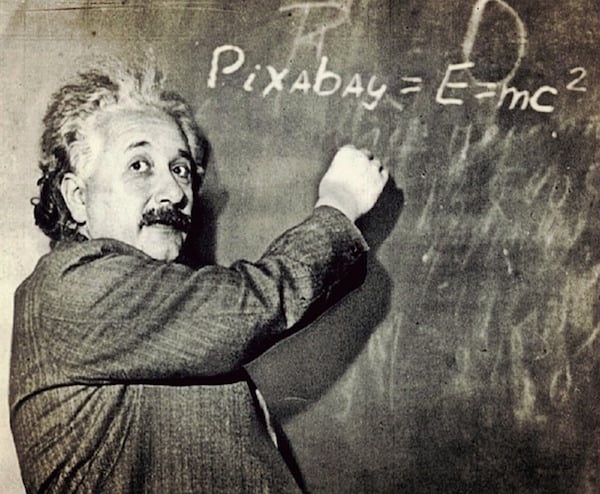
Why do you want this job, anyway? What makes you think you're qualified?
Question 4: Why Do You Want This Job?
This question wants you to explain why you’re pursuing the position and why you think the organization should hire you. Presumably, you’ve done some thinking about this before applying. Now it’s time to form an answer that won’t just share what you want, but will also show the manager that you’d make a great hire.
How can you answer this interview question, and what mistakes should you avoid?
This question's the perfect opportunity to showcase your enthusiasm for the new job and show why you'd excel in the role. Make sure to give specific reasons for wanting the job . Show that you don't just want any job; you want that specific job. If you have any particular connections to the company - maybe you use its products or know someone who works there - then you could bring that up here.
Of course, the interviewer wants to hire someone who's not just enthusiastic, but who's also qualified. In your answer, then, don't just talk about your aspirations. Talk about what you could do for the organization. Demonstrate a thorough understanding of the organization's mission, and show that it aligns with your own professional goals.
You don't want to be too practical in your answer here. "Because I need money for rent, food, and Netflix," while true, isn't an ideal response.
You also don't want to be too generic or vague by saying something like, "I heard this company's an awesome place to work." Aim to be much more specific than that.
Check out a sample response to this question below that's specific, shows enthusiasm, and incorporates both the speaker's goals and the organization's mission.
Sample Answer to Question 4
This applicant’s applying to a programming position in a start-up in the environmental sphere. The job description wants someone who’s willing to take on a range of responsibilities, cares about its environmental mission, and knows CSS, Java, and Ruby.
I’m drawn to start-ups because I’d love to be part of building a company from the ground up. I really appreciate its culture of a small, close-knit team of passionate people who are ready and willing to wear many hats. With my versatile skill set in computer programming and experience building websites, I feel my interests and skills are perfectly aligned with this position of web developer. I would use my knowledge of CSS, Java, and Ruby to build out the company website and grow our online presence. I also share this company's commitment to sustainability. I’m extremely motivated by your environmental mission and could immediately start taking steps to meet your short-term and long-term goals.
This sample response sounds honest and authentic, while also bringing in some core skills of the jobs.

Don't evade this next question about a time that you failed, but make sure to shift focus onto the personal and professional growth that followed.
Question 5: Describe a Time That You Failed
This question is a behavioral one, because it asks you to talk about a specific example that illustrates something meaningful about you as a professional.
Some variations of this question might ask you to talk about a conflict at work, a challenge, or a behavior that negatively impacted your team. So how can you describe a failure while still leaving a positive impression of your skills and abilities?
Just like with the weaknesses prompt you read about above, you should focus on the failure as an opportunity for growth. Be honest about your past mistake, but then shift focus to talk about what you learned from it, how you changed, and what you would do differently next time. This not only shows that you’re willing to acknowledge when you mess up, but it also shows that you’re continuously seeking to improve.
Again, you should probably avoid choosing a failure or conflict that arose because you lacked a core competency of the job. Just as with all your other answers, you can be strategic about what you choose to talk about here.
While talking about failures can be uncomfortable, you shouldn’t evade the question. Nor should you speak in vague language about lacking a certain skill or knowledge. This behavioral question wants you to share a specific example, so make sure you have one to fall back on.
You also shouldn’t focus too much on the negative aspects of your example . As mentioned above, you should talk about what happened and its context, but otherwise focus on the growth and learning that came from it.
Below is a sample answer that does this well.
Sample Answer to Question 5
In this sample answer, a teacher talks about a mistake she made with a summer course she taught. Notice how she talks just as much about what she learned as about the failure itself.
The first class I taught was a four-week essay writing course for high schoolers over the summer. Due to the short-term nature of the course, I jumped right into the material without setting aside time to talk about behavioral expectations. Issues later arose, like students showing up late, talking over each other, and using cell phones in class, that could have been prevented, or at least reduced, if I’d taken the time to lay the groundwork. That course was a huge learning experience for me, and since then I always take time on the first day to discuss classroom norms. To make students feel more invested and accountable, I also elicit ideas from them on what they need from me and from each other in their ideal learning environment. That mistake in my summer class taught me a lot about the importance of proactive behavioral management. I can always loosen the reins as I go, but it’s much harder to rein them back in once they’re out.

Don't be shocked if you interviewer throws a curveball question at you, like, "If you were an animal, what animal would you be?"
Question 6: If You Were an Animal, Which One Would You Be and Why?
Ok, so chances are you won’t get this exact question. But lots of interviewers like to throw in random curveballs that shake you out of your comfort zone and call for some imagination and quick thinking.
Beyond offering a chance for some lighthearted humor and creativity, these seemingly random questions may represent one more way that interviewers try to gauge your cultural fit.
Instead of asking about your spirit animal, a hiring manager might ask what you would change about the last five years of your life, what the name of your debut album would be, or what your personal motto is. You can find more examples of curveball questions here, including some that were asked by big companies like Dropbox, Hubspot, and Whole Foods.
So is there any way you can prepare for the unpredictable? Check out the advice below, as well as a sample answer to this question.
Show your personality! Have fun with these questions. They’re opportunities to spark a connection with your interviewer and say something memorable.
You may still have the chance to tailor your answer to the job description. Someone applying to a customer service type role, for instance, might choose a dog in answer to the animal question. Dogs are loyal, friendly, and supportive, so they could link well to the job description.
If you’re totally thrown, you might buy yourself some time by saying, "That’s a great question. I’ll have to think about that for a second..."
Depending on your rapport with the interviewer, you could even ask her what her answer would be to that same question!
Don’t overthink these questions too much. They’re typically meant to be more lighthearted and fun. At the same time, don’t dismiss them as entirely silly ; some might be aiming to learn more about how you deal with unpredictability in the workplace, or instance.
In answer to the animal question specifically, you should also avoid choosing something with largely negative connotations for the sake of trying to be unique. I’d probably avoid the snakes and vultures, unless you can think of a really ironclad reasoning for going this way!
Sample Answer to Question 6
This might be a good answer for a job that calls for a lot of teamwork and collaboration.
I’d be an elephant. They’re smart, loyal, and work well in groups. Plus, the elephant was my beloved college mascot.
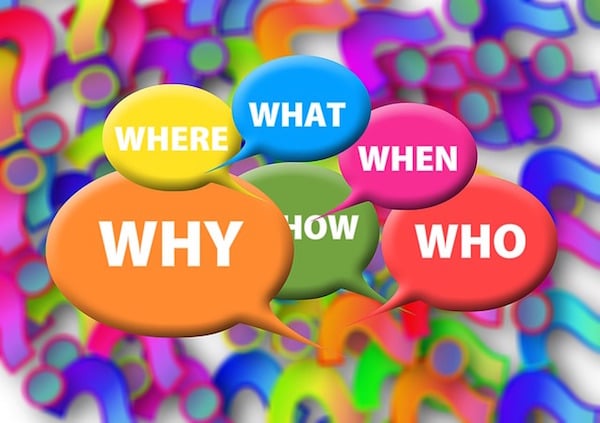
Make sure to save a few great questions for the end of your interview. They could start with any of the five W's, but don't be afraid to think outside of the speech bubble.
Question 7: Do You Have Any Questions for Me?
Finally, almost all hiring manager ask this final question at the end of the interview. Even if you’ve asked questions throughout, you should have two or more good ones saved for the end.
Ask questions! You might ask about what the day-to-day is like or if the interviewer could give more insight into the culture. You could ask the interviewer to elaborate on something you discovered through your research, as this is one more way you can show the effort you put in to learn about the company.
Ask questions that show you want to know more about what you can do for the organization and are genuinely interested in learning more about the workplace and its values.
Don’t say, "No, I’m all set. All my questions have been answered.” You should absolutely ask questions at the end of your interview.
Besides declining to ask questions, another mistake would be to ask easy questions that you could easily answer through research on the website . You want to show that you’re knowledgeable about the company, so don’t ask anything too obvious, like, "So what exactly do you do here?"
A first interview might also be too early to ask about schedule, benefits, and salary . At this point, you’re trying to show the hiring manager all the value that you could bring to the role and company, so continue focusing on what you could do for them. Similarly, I’d also avoid asking when you can expect to get promoted!
Below are some possible questions to ask your interviewer. If you can think of questions in the back of your mind based on what you’ve discussed during your interview, all the better!
Sample Questions to Ask:
- Could you tell me about a typical day here at the company?
- What sort of training could I expect for the position?
- How do you evaluate performance here? Do the expectations change at all over time?
- What directions do you see the company going in in five years? Ten years?
- Could you tell me a little more about the team members I would be working with?
- How would you describe the work environment here?
- Would you say that people work more collaboratively or more independently?
- What do you love most about working here?
- What would you say are the most important qualities that the person in this position should have?
- What qualities do your best performing employees share?
- How does the organization help its employees succeed?
- What could I do to go beyond expectations in the first 30 or 60 days?
- If I were to start in the role tomorrow, what would be my first priority?
- Are there opportunities for more training or education?
- What are the next steps in the interview process?
The hiring manager might ask you all sorts of questions, but several are likely to be a variation of the common ones you see above, if not those questions themselves. You’ll talk about your strengths, weaknesses, goals, and background, all the while tailoring your answer to the job description and company mission.
You might have noticed some similar themes pop up in terms of how to prepare your responses. Below, you’ll find four steps that will help you answer just about any job interview question.

Beyond the specific questions above, let's consider some universal steps you can take to answer any interview question.
How to Answer Job Interview Questions: 4 Key Steps
Doing well in a job interview isn’t just about presenting all your strengths and skills. It’s also about strategically convincing the hiring manager that you’re the candidate she’s looking for.
So how can you be strategic about each of your interview responses? Read on for four steps that will help you answer any interview question.
Step 1: Deconstruct the Job Description
Before you interview, if not before you apply, you should take some time to understand exactly what the company is looking for. What responsibilities does the job description entail? What skills would you need to be successful in the role? What kind of person does the company hope will join its team? What does your interviewer do in the company, and what connection could you make with her?
Your mission is to show that you have the skills and experiences to contribute in the role. You want to show that you’d bring value and make a strong cultural fit. As you research the organization, you might also look for any “pain points,” or problems that it needs solved.
Once you’ve deconstructed the job description and have a thorough understanding of the role and organization, you can reflect this awareness in your answers to interview questions.
Step 2: Come Up with Specific Examples
Hiring managers often look to your past behaviors to get a sense of your future behaviors. They also want to see how your skills and experiences express themselves in concrete actions.
To prevent your answers from seeming overly vague, you should be ready with examples. To help you brainstorm, you might consider the STAR framework, which stands for Situation, Task, Action, and Result.
You start by describing the situation you were in and the task that you had to do. Then you talk about what you did and how you did it , and finally elaborate on what happened as a result of your actions. You could talk about an impact that your action had on your team or what you might improve for next time.
To prepare for the various types of behavioral questions, you could collect stories that have to do with a time that you succeeded, failed, faced a challenge, handled conflict, demonstrated leadership, and impacted your team in some way.
Make sure that all of your examples, even the ones that point out a conflict or mistake, are success stories. Even if you failed in some sense, you learned from it and improved for next time.
If you don’t have directly relevant professional experience, you should still root out examples from other jobs, your education, or even personal life that illustrate your qualifications.

Don't look now; you're being followed! Your interviewer's likely to follow your lead and ask follow-up questions based on your responses.
Step 3: Prepare for Follow-Up Questions
Beyond the initial interview question, your interview may ask you to elaborate on something you said or dig deep into a certain aspect of your answer. Most interviews are more like a conversation than a question-and-answer session. Your interviewer will likely be actively listening to what you say, reflect your words back, and follow-up with a related question.
As such, your answers and examples should be substantial enough to speak at length about. As you prepare, you might imagine yourself in the shoes of the interviewer. What aspects of your answer would stick out? Which ones would be intriguing and warrant additional discussion?
Don’t expect to answer every question in one go and go on to the next. Be prepared to dig into your responses and branch into new directions .
Step 4: Customize your Answers
Finally, the theme that’s pervaded this whole guide is that you should customize your answers to the job and organization. As you prepare, consider what qualities the organization and hiring manager are looking for.
Your answers aren’t just about you and what you want. They’re also very much about the organization and what it wants.
Most hiring managers have a clear idea of the skillset and other qualities they’re looking for in a new hire. Show that you possess those core competencies in each of your answers. If you can also offer something beyond expectations, all the better!
While you should be authentic and allow your personality and goals to shine through, you should also be strategic about what you say. Everything you share could ideally go on the hiring manager’s list of reasons to hire you for the job!
What’s Next?
You’ve just considered seven of the most common job interview questions. Now check out our full list of the top 100 questions that hiring managers ask in an interview !
Beyond preparing your responses, what else can you do to get ready for interview day? Check out our top tips to help you feel prepared and confident to rock your job interview .
One of the first steps to applying for a job is putting together a great cover letter. Our cover letter template helps guide you through the writing process, step by step . Plus, you can read six samples of excellent cover letter samples for jobs !
Rebecca graduated with her Master's in Adolescent Counseling from the Harvard Graduate School of Education. She has years of teaching and college counseling experience and is passionate about helping students achieve their goals and improve their well-being. She graduated magna cum laude from Tufts University and scored in the 99th percentile on the SAT.
Student and Parent Forum
Our new student and parent forum, at ExpertHub.PrepScholar.com , allow you to interact with your peers and the PrepScholar staff. See how other students and parents are navigating high school, college, and the college admissions process. Ask questions; get answers.

Ask a Question Below
Have any questions about this article or other topics? Ask below and we'll reply!
Improve With Our Famous Guides
- For All Students
The 5 Strategies You Must Be Using to Improve 160+ SAT Points
How to Get a Perfect 1600, by a Perfect Scorer
Series: How to Get 800 on Each SAT Section:
Score 800 on SAT Math
Score 800 on SAT Reading
Score 800 on SAT Writing
Series: How to Get to 600 on Each SAT Section:
Score 600 on SAT Math
Score 600 on SAT Reading
Score 600 on SAT Writing
Free Complete Official SAT Practice Tests
What SAT Target Score Should You Be Aiming For?
15 Strategies to Improve Your SAT Essay
The 5 Strategies You Must Be Using to Improve 4+ ACT Points
How to Get a Perfect 36 ACT, by a Perfect Scorer
Series: How to Get 36 on Each ACT Section:
36 on ACT English
36 on ACT Math
36 on ACT Reading
36 on ACT Science
Series: How to Get to 24 on Each ACT Section:
24 on ACT English
24 on ACT Math
24 on ACT Reading
24 on ACT Science
What ACT target score should you be aiming for?
ACT Vocabulary You Must Know
ACT Writing: 15 Tips to Raise Your Essay Score
How to Get Into Harvard and the Ivy League
How to Get a Perfect 4.0 GPA
How to Write an Amazing College Essay
What Exactly Are Colleges Looking For?
Is the ACT easier than the SAT? A Comprehensive Guide
Should you retake your SAT or ACT?
When should you take the SAT or ACT?
Stay Informed
Get the latest articles and test prep tips!
Looking for Graduate School Test Prep?
Check out our top-rated graduate blogs here:
GRE Online Prep Blog
GMAT Online Prep Blog
TOEFL Online Prep Blog
Holly R. "I am absolutely overjoyed and cannot thank you enough for helping me!”
🗣️ Interview Essays
Establishing a new recruitment interview process using business modeling software.
Introduction The preparation of procedures manual entails stages and specific processes that encompass writing a preliminary outline, drafting the proposal, designing a brochure, detailing the…
Interview Report on Christianity
Christianity is one of the oldest and largest religions in the world. Christianity as a religion is based on the life and teaching of a…
Customer Relationship Management and Marketing in the Event Management (Entertainment)…
1. Introduction 1.1. Research Background Customer relationship management (CRM) is an integrated approach aimed towards managing associations with the end users by emphasizing customer retention…
Performance Management Assessment
Executive summary This paper present a report on the findings of an interview with Mr. Antony. Mr. Antony posseses great leadership skills and currently works…
How to Have Effective Presentations
A presentation refers to giving of a lecture to a group, which acts as the audience (Labaree, 2010). A presentation is given by a person…

Michael Jackson Interview
In the video of Michael Jackson interview, Michael appears as an effective speaker (Sawyer 1). While speaking, Michael knew well that he was addressing Sawyer…
Stopping/Prevention of Aging
Aubrey de Grey overview of aging brings to the fore the most debated conundrum of our times on which is less or more important between…
Friendships among university students
Abstract This paper explores a qualitative study which concentrates on friendships among undergraduate students from Liverpool John Moores University. The study has been conducted from…
Interview Simulation Review
Review of Joe Johnson’s resume Joe attended training at the Community and Valley College where he went through Welding and Machining classes. However, grade or…
Analysis of Narconomics Interview
Introduction America’s war on narcotic drugs has been implemented through diverse measures, such as destruction of opioid leaf farms in source countries, arresting drug cartel…
Social worker interview report
Education background and training The social worker graduated from Alabama University in 1997 with a Bachelors of Social Work and ended up getting her license…
The advantages and disadvantages of using questionnaires in research
News media, government agencies, political parties want to know what the public thinks; associations want the opinion of the members; companies want to know how…
Reaction Paper on “David Cole Interviews Dr. Franciscek Piper”
A Jewish revisionist, David Cole, who has spent extensive time and effort to evaluate and review the events of the Holocaust, was trying to validate…
Interview analysis
The terror attacks in September 11, 2001 famously the 9/11 prompted the ‘War on Terror’ under George Bush’s administration. Four airlines that were hijacked by…
Bullying and cyber bullying at school
The act of bullying among children has been in schools for many decades and has resulted in different outcomes depending on the intensity of the…
What is the best site to search for quality interview paper samples?
The Essaywriter database is the best online hub for excellent samples on this subject and many others.
How to use interview essay samples to create my own paper?
You may use a sample interview paper to expand your knowledge base about business, psychological, and research interviews.
Is it allowed to submit your samples as mine?
Freely use our interview essay paper examples to boost your writing skills but avoid presenting them as your work.
How many samples can I find here?
You can find thousands of essay samples on interviews and other different subjects.
Writing academic papers about interviews is common among business and medical students. Sometimes, you might face challenges due to poor writing skills or pressing deadlines. When that happens, you can always use inspiring samples for guidance. Our database contains expertly crafted papers to unlock your inspiration. Read to learn how to benefit from Grademiners samples and use them in your own projects.
Interview Essays Examples
Every media personality, political party, and state agency in the United States of America wants to know what the public thinks. They employ interviews as a view-gathering tool. Students writing interview articles explore how businesses harness it to communicate with their target audience.
It also exposes them to practical data-gathering skills they will need while plying their trade. This subject teaches how to be a good interviewee because some workers in formal employment answer questions from the media. Scholars also learn to capture non-verbal body language during corporate communication and journalism.
Some students face various difficulties when writing about interviews. For instance, they might lack the confidence to express their thoughts freely.
Interview Essay Sample
Our database is all you need to sharpen your essay skills. We created this free online library to help students find everything they require for their writing assignments. This databank contains various interview essay examples to fire you up for future papers on this subject. Below are three exciting ways you can use this platform to compose killer essays on this topic and many others.
Get professional paper examples for your inspiration
A wise person once said, “tell me, and I will forget; show me, and I will remember for life.” This saying demonstrates the power of showing a person a good example. Our expert essay samples inspire you to write better articles, as you may use any example of an interview paper to compose a winning assignment and fetch high grades. Thus, we give you these models to save the time you would have wasted reinventing the wheel.
Learn excellent topic choice and structure
Any student who values their readers will seek the best way to present valuable information on a given title. You need to give your readers an easy time reading your papers, so they should possess a coherent and logical flow. You can learn from how our writing experts structure their thoughts. Our papers also contain various topics you can use to develop your own assignments.
Taste our team’s writing quality
We understand that some students need practical examples of what our writers can produce. Thus, we give you rest by showcasing our writers’ best essay writing examples for interview. These samples demonstrate our team’s expertise and skills in different educational fields. Moreover, every writer seeking a writing job on our platform must prove their qualification and ability to compose authentic papers with well-written, logical writing. That’s what you see when looking at the samples on our platform, ensuring that every author assigned to your order is a professional.
Interview Paper Examples to Jumpstart Your Writing
A free interview paper sample from our database can unlock your writing potential. But if your search doesn’t land you the inspiration you need for your assignment, don’t despair. We have a professional team of writers ready to assist you. Feel free to talk to us today about all your essay needs.
- Advertising
- Freedom of Speech
- Hate Speech
- Media Analysis
- Media Manipulation
- Social Networking

Deconstructing the Interview: a Scholarly Critique
This essay is about critically analyzing the interview process within scholarly research. It discusses the significance of interviews as a method of inquiry, highlighting methodological considerations such as power dynamics and participant self-presentation. The importance of crafting effective questions and the interpretive role of researchers are also explored. Ethical considerations, including informed consent and participant confidentiality, are emphasized. Overall, the essay underscores the complexities involved in conducting interviews and the need for researchers to navigate these challenges with care and sensitivity.
More free essay examples are accessible at PapersOwl about Interview.
How it works
In the realm of academic discourse, the interview stands as a fundamental method of inquiry, serving as a conduit through which researchers glean insights into human experiences, perspectives, and behaviors. This essay undertakes a critical examination of the interview process, exploring its complexities, nuances, and implications within scholarly research.
The Significance of the Interview At its core, the interview represents an interactive exchange between researcher and participant, wherein narratives are constructed, meanings elucidated, and truths uncovered. Through dialogue and reflexivity, researchers endeavor to unravel the intricacies of human thought and behavior, shedding light on phenomena that may otherwise remain opaque.
Methodological Considerations While interviews offer a rich source of qualitative data, they are not without methodological challenges. Issues of power dynamics, interviewer bias, and participant self-presentation loom large, necessitating a vigilant approach to data collection and analysis. Researchers must navigate these pitfalls with precision, employing techniques such as bracketing, member checking, and triangulation to ensure the integrity and trustworthiness of their findings.
The Art of Questioning Central to the interview process is the art of questioning. Researchers must craft inquiries that are open-ended yet focused, probing yet respectful, allowing participants the space to articulate their experiences authentically. Through strategic questioning techniques such as probing, clarifying, and summarizing, researchers can elicit deeper insights and uncover hidden dimensions of meaning within participants’ narratives.
The Role of Interpretation Beyond the act of data collection lies the interpretive endeavor, wherein researchers analyze, synthesize, and make sense of the information gleaned from interviews. Interpretation is a multifaceted process, influenced by theoretical frameworks, disciplinary perspectives, and personal biases. As such, researchers must remain vigilant in their reflexivity, interrogating their own assumptions and preconceptions to arrive at nuanced and contextually grounded interpretations.
Ethical Considerations Ethical principles loom large in the conduct of interviews, demanding a commitment to respect, beneficence, and justice. Researchers must obtain informed consent, safeguard participant confidentiality, and mitigate potential harms arising from their inquiries. Moreover, they must grapple with issues of representation and voice, ensuring that participants’ narratives are presented in a manner that is both accurate and respectful.
Conclusion In conclusion, the interview stands as a cornerstone of qualitative inquiry, offering researchers a window into the lived experiences, perspectives, and meanings that constitute the human condition. Yet, its practice is fraught with complexities, requiring researchers to navigate methodological, ethical, and interpretive challenges with skill and sensitivity. Ultimately, the interview represents not only a method of data collection but a mode of engagement—one that holds the potential to illuminate, challenge, and enrich our understanding of the world around us.
Cite this page
Deconstructing the Interview: A Scholarly Critique. (2024, Mar 01). Retrieved from https://papersowl.com/examples/deconstructing-the-interview-a-scholarly-critique/
"Deconstructing the Interview: A Scholarly Critique." PapersOwl.com , 1 Mar 2024, https://papersowl.com/examples/deconstructing-the-interview-a-scholarly-critique/
PapersOwl.com. (2024). Deconstructing the Interview: A Scholarly Critique . [Online]. Available at: https://papersowl.com/examples/deconstructing-the-interview-a-scholarly-critique/ [Accessed: 11 Apr. 2024]
"Deconstructing the Interview: A Scholarly Critique." PapersOwl.com, Mar 01, 2024. Accessed April 11, 2024. https://papersowl.com/examples/deconstructing-the-interview-a-scholarly-critique/
"Deconstructing the Interview: A Scholarly Critique," PapersOwl.com , 01-Mar-2024. [Online]. Available: https://papersowl.com/examples/deconstructing-the-interview-a-scholarly-critique/. [Accessed: 11-Apr-2024]
PapersOwl.com. (2024). Deconstructing the Interview: A Scholarly Critique . [Online]. Available at: https://papersowl.com/examples/deconstructing-the-interview-a-scholarly-critique/ [Accessed: 11-Apr-2024]
Don't let plagiarism ruin your grade
Hire a writer to get a unique paper crafted to your needs.

Our writers will help you fix any mistakes and get an A+!
Please check your inbox.
You can order an original essay written according to your instructions.
Trusted by over 1 million students worldwide
1. Tell Us Your Requirements
2. Pick your perfect writer
3. Get Your Paper and Pay
Hi! I'm Amy, your personal assistant!
Don't know where to start? Give me your paper requirements and I connect you to an academic expert.
short deadlines
100% Plagiarism-Free
Certified writers
- Crimson Careers
- For Employers
- Harvard College
- Harvard Kenneth C. Griffin Graduate School of Arts & Sciences
- Harvard Extension School
- Premed / Pre-Health
- Families & Supporters
- Faculty & Staff
- Prospective Students
- First Generation / Low Income
- International Students
- Students of Color
- Students with Disabilities
- Undocumented Students
- Explore Interests & Make Career Decisions
- Create a Resume/CV or Cover Letter
- Expand Your Network
- Engage with Employers
- Search for a Job
- Find an Internship
- January Experiences (College)
- Find & Apply for Summer Opportunities Funding
- Prepare for an Interview
- Negotiate an Offer
- Apply to Graduate or Professional School
- Access Resources
- AI for Professional Development and Exploration
- Arts & Entertainment
- Business & Entrepreneurship
- Climate, Sustainability, Environment, Energy
- Government, Int’l Relations, Education, Law, Nonprofits
- Life Sciences & Health
- Technology & Engineering
- Still Exploring
- Talk to an Advisor
How to Answer “Tell Me About Yourself” in an Interview (Plus Examples!)
- Share This: Share How to Answer “Tell Me About Yourself” in an Interview (Plus Examples!) on Facebook Share How to Answer “Tell Me About Yourself” in an Interview (Plus Examples!) on LinkedIn Share How to Answer “Tell Me About Yourself” in an Interview (Plus Examples!) on X
By Stav Ziv
“Tell me about yourself” might seem like an easy win of an interview question —after all, you know all about yourself! And good thing, too, because it’s often the very first thing an interviewer will ask you to do—whether you’re having a preliminary phone screen, speaking to your prospective boss, or sitting down with the CEO during the final round.”
Read the full article on The Muse: https://www.themuse.com/advice/tell-me-about-yourself-interview-question-answer-examples
The Play “Poof!” by Lynn Nottage Essay
Poof! is a play written by Lynn Nottage that tells a fictionary story of a person’s sudden combustion in certain circumstances. Particularly, a husband and a wife had an argument that almost turned into violence, causing the husband to combust before he could do any harm. The central theme explored in this situation is domestic abuse (Perkins et al. 296). The theme is explained and illustrated in the context of guilt, female friendship, patriarchy, and the failure of police and justice systems.
Loureen is a victim of abuse, and the question of how to respond and react to it is posed within the play. At the very beginning, a note states: “Nearly half the women on death row in the United States were convicted of killing abusive husbands. Spontaneous combustion is not recognized as a capital crime” (Nottage 91). This note prematurely raises a philosophical concern – how can society convict women who were harmed in the first place? The play then suggests that Loureen has committed no crime, and anyone who defends themselves from the abuse has not committed it either.
The fact that Loureen turned her husband, Samuel, to ash with her voice shows that silencing is one of the abusers’ greatest tools for keeping power. As a partial reason for keeping silent, the play explores guilt as an entrapping and nonproductive emotion. Before Loureen realizes Samuel is gone, she experiences guilt – for instance, she apologizes for not picking up his shirt (Nottage 94). Moreover, she feels guilty and afraid of Samuel’s mother (Nottage 98). Such thoughts perpetuate Samuel’s power over Loureen, which is evident even after his death. In this context, the issue of suffering in silence defines Loureen’s friend Florence as well. The play emphasizes the importance of these female friendships, as the women quite literally kept each other alive. This deep trust is demonstrated from the beginning when Loureen calls her friend to come after Samuel’s death. Furthermore, it is shown that Florence spent many nights with Loureen when Samuel was violent, and they had been preparing a getaway plan together.
The play showcases a traditional patriarchal structure in the family, where the men hold all the power while the women are placed in subordinate positions. We can see this in the way that Loureen and Florence cook dinner for their husbands or iron their clothes – it is not an act of care but an obligation. Despite these examples seeming harmless, they originate from the same place that allows and encourages their husbands’ violence and neglect. By living within such a structure, Loureen and Florence have learned to be silent while mistreated. Moreover, Nottage also shows that society many times rejected their pleas for help, commenting on calling the police: “Why? What are you gonna tell them? About all those times they refused to help… ?’” (102). Unsurprisingly, the only way for Loureen to be free is for the whole system to explode. Unfortunately, Florence still remains stuck within it, believing her duty is not to herself but to her family.
Nottage illustrates how domestic abuse can ruin people’s lives and families. She highlights that victims often remain silent due to the sense of guilt and seeming helplessness due to the absence of systematic support from society. The only relief they can find rests in people who share the same problem, but it is only enough to prolong the suffering, not to break the cycle. Hopefully, with sufficient attention to the topic, sudden combustion would stop being the sole solution to the issue of domestic abuse.
Works Cited
Nottage, Lynn. Crumbs from the Table of Joy and Other Plays . Theatre Communications Group, 2004.
Perkins, Kathy A. et al., editors. The Routledge Companion to African American Theatre and Performance . Routledge, 2019.
- Chicago (A-D)
- Chicago (N-B)
IvyPanda. (2024, April 4). The Play "Poof!" by Lynn Nottage. https://ivypanda.com/essays/the-play-poof-by-lynn-nottage/
"The Play "Poof!" by Lynn Nottage." IvyPanda , 4 Apr. 2024, ivypanda.com/essays/the-play-poof-by-lynn-nottage/.
IvyPanda . (2024) 'The Play "Poof!" by Lynn Nottage'. 4 April.
IvyPanda . 2024. "The Play "Poof!" by Lynn Nottage." April 4, 2024. https://ivypanda.com/essays/the-play-poof-by-lynn-nottage/.
1. IvyPanda . "The Play "Poof!" by Lynn Nottage." April 4, 2024. https://ivypanda.com/essays/the-play-poof-by-lynn-nottage/.
Bibliography
IvyPanda . "The Play "Poof!" by Lynn Nottage." April 4, 2024. https://ivypanda.com/essays/the-play-poof-by-lynn-nottage/.
- Women, Friendships, Marriage in Lynn Nottage’s “Poof!”
- History in "Intimate Apparel" Play by Lynn Nottage
- Feminist Perspective in “Ruined” Play by Nottage
- “The Power of Horses” Story by Elizabeth Cook-Lynn
- Elizabeth Cook-Lynn “Grandfather at the Indian Health Clinic” - Picturesque Description of Grandfather
- Lynn's “My Cousin Vinny”: Movie About Two Friends
- Greg Lynn's Architectural Curvilinearity
- "First Person Plural" by Lynn Hershman
- Initiation Themes in Literature Works
- "Dear John" Movie by Lassa Hallstrom
- Shakespeare's Richard III Play vs. The Godfather II Film
- A Bird in a Cage in Susan Glaspell's “Trifles” Play
- "The Love Suicides at Sonezaki" by Chikamatsu and "Romeo and Juliet" by Shakespeare
- Analysis of the Play “William Tell” by Schiller
- "The Glass Menagerie" by Tennessee Williams Play Critique

IMAGES
VIDEO
COMMENTS
1. Think about your essay's purpose. The first step is to think about your essay's purpose. This consideration can help you determine what questions to ask during the interview, how to conduct it and how to write the resulting essay. For example, you may want to write an interview essay as an informative, factual piece for others to educate ...
Learn how to write an interview paper step by step with this comprehensive guide. Find out how to choose a topic, format, structure, and conduct an interview with an expert or a regular person.
Like a triangle, begin at the top of the paragraph with a narrow-focused summary of the interviewee's main message. Then, continuing the triangle analogy, expand outwards and downwards from that point. Deliver the broader context for why the interview matters. To end the essay, quote how the interviewee said goodbye.
2. Plan an outline of the essay. The outline will depend largely on the essay format you are following, but a strong introduction, which clearly identifies your subject and the goals and focus of your interview, is always important. [8] Read over your interview notes and listen to any audio / video recordings you have.
Guidelines for an Interview Essay. When writing an interview essay, it would be best to create an outline first. Organize the information you have gathered from your interviewee and structure it in a logical order. This could be from one's personal information to the most compelling details gathered. Be reminded of the standard parts of an ...
Write your questions. Set up a time to meet with people (you will probably start with at least one in-class interview of another student). Ask questions and record the answers. Analyze the results. Write your essay. Start with the question, followed by a summary and analysis of the questions and answers.
An interview essay is a written composition that presents the insights, experiences, and viewpoints of an individual obtained through a structured conversation or interview. This type of essay goes beyond merely summarizing the interviewee's responses; it integrates narrative storytelling with analytical components to provide a comprehensive ...
Interview Essay Example. To illustrate the art of turning a conversation into a compelling essay, let's delve into an interview essay sample with Sarah Rodriguez, an avid urban gardener with a green thumb and a passion for sustainable living. Through this example, we'll explore how to capture the essence of someone's experiences and insights ...
A standard interview essay from a custom writing service can range from 2,000 to 5,000 words or up to ten pages. Individual works are usually shorter. The interview essay format will have an introduction, body segments (perspectives grouped under different subheadings), and a summary. Here's an overview of what to put in each part.
Analyse the information / answers given by your interviewee. Once you have followed these stages, you can draft / outline your interview essay in a more standard format: Break up the responses into key themes or points that you will make. Identify any other sources that you will use in your essay. Give an approximate word count to each section.
Here is a breakdown of each section: 1. Introduction. The introduction should provide background information about the interviewee and the topic being discussed. It should also include a thesis statement that presents the main argument or purpose of the essay. 2. Body Paragraphs.
Writing an Interview Essay Body Paragraphs. The body paragraphs hold the majority of the essay. Provided paragraphs support the central statement with relatable facts, details, and key points as the answers that an interviewer asks. Some of the interviewers prefer to use a recording device, while others opt for notes to contain the important ...
Step three: The interview. If at all possible, arrange to conduct the interview at the subject's workplace. It will make them more comfortable, and you can write about their surroundings. Develop rapport that will make the interview easier for both of you. The more silence in the room, the more honest the answer.
An interview essay has an introduction, body and conclusion that ties together. The purpose is to tell a story about the person who shared life experiences and accomplishments with the writer. ... Interview essay examples might tell a story of how your subject overcame poverty, received a Purple Heart or patented an invention. Even everyday ...
An interview essay needs to have a backbone so that it will be well written and the thoughts that are included within the writing organized. For this function, you may browse through our Essay Sample Outline Template and see how it can help you in creating proper formats and structured sample order of thoughts for your interview essay and other kinds of write-ups.
First, you'll want to introduce the person or people you interviewed. This can be done by providing a brief overview of who they are and why you decided to interview them. Next, you'll want to include a thesis statement. This is a sentence or two that sums up the main point of your essay. It should be clear and concise, and it should give ...
Step 1: Prepare for the Interview. Before conducting an interview, it is crucial to prepare thoroughly. Research the interviewee's background, accomplishments, and expertise. Familiarize yourself with their work and any relevant topics. This preparation will help you ask informed questions and create a well-rounded essay.
This would be in the form of an essay. This is usually about your experiences, your skills and all the basic information they need to know more about you. They do this to see and to understand you as a person. Here are some 7+ job interview essay examples you can check out for some tips on what to write and what to avoid.
Interview Essay Example: An interview essay is a type of composing that transfers the data being assembled through an example Interview. It is done to make the perpetrators educated of the things examined during the screening. This kind of exposition permits the author to hand off their impacts on the example Interview that happened and the exact information from the Interview.
Sample Answer to Question 1. In this sample response, the applicant's applying for a customer service job in a retail company. The job she seeks calls for strong interpersonal skills and an upbeat, optimistic attitude. I've always loved interacting with people and feel I have strong interpersonal skills.
Interview Essay Sample. Our database is all you need to sharpen your essay skills. We created this free online library to help students find everything they require for their writing assignments. This databank contains various interview essay examples to fire you up for future papers on this subject. Below are three exciting ways you can use ...
In the realm of academic discourse, the interview stands as a fundamental method of inquiry, serving as a conduit through which researchers glean insights into human experiences, perspectives, and behaviors. This essay undertakes a critical examination of the interview process, exploring its complexities, nuances, and implications within ...
By Stav Ziv "Tell me about yourself" might seem like an easy win of an interview question—after all, you know all about yourself! And good thing, too, because it's often the very first thing an interviewer will ask you to do—whether you're having a preliminary phone screen, speaking to your prospective boss, or sitting down with the CEO during the final round."
Poof! is a play written by Lynn Nottage that tells a fictionary story of a person's sudden combustion in certain circumstances. Particularly, a husband and a wife had an argument that almost turned into violence, causing the husband to combust before he could do any harm. The central theme explored in this situation is domestic abuse (Perkins ...